Editor’s note: TPG purchased an economy ticket on Air France but accepted a complimentary upgrade onboard to premium economy. All opinions expressed here are the author’s own and were not subject to review by Air France or any other entity.
Though Air France first introduced its Premium Economy product under the name Premium Voyageur in 2009, it hasn’t changed much since then and is known as the first fixed shell seat in a premium economy cabin.
Fourteen years later, this controversial seat is what you’ll find in premium economy on most Air France international flights, including all wide-body Air France aircraft, such as the Boeing 777 and Boeing 787 and Airbus A330 and A350.
When I decided to go to a wedding in Greece in July, Air France was one of the more affordable options for a last-minute booking, and the ticket was still over $2,000 round-trip. I booked from Chicago O’Hare International Airport (ORD) to Athens International Airport (ATH) with a layover at Paris Charles de Gaulle Airport (CDG).
I was curious to see how this fixed shell seat would work for an overnight flight compared with other premium economy products I’ve flown.
Aboard my first-ever Air France flight, I anticipated a more comfortable journey, but would it be worth the price?
Here’s what the experience was like.
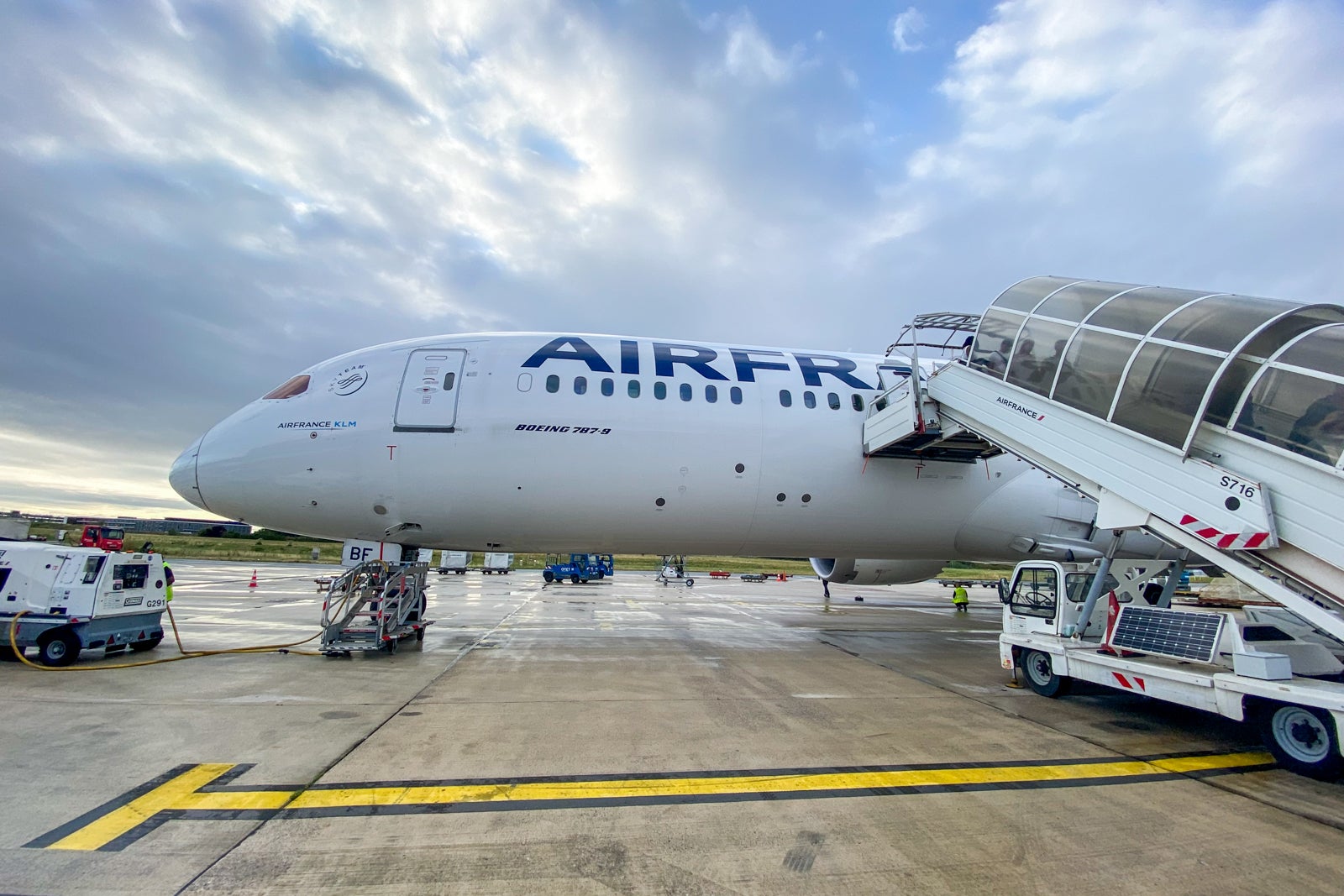
How to book premium economy on Air France
Air France premium economy tickets from Chicago to Paris usually start around $1,400 round-trip and can be as much as $2,700 for nonstop flights or between 45,000-300,000 Flying Blue miles. You can also book Air France with Delta SkyMiles thanks to their SkyTeam partnership. At the time of publication, the cheapest rate for this flight on Delta Air Lines was 188,000 Delta SkyMiles plus $88 in taxes and fees, but rates ranged all the way up to 360,000 SkyMiles round-trip through the end of the year.
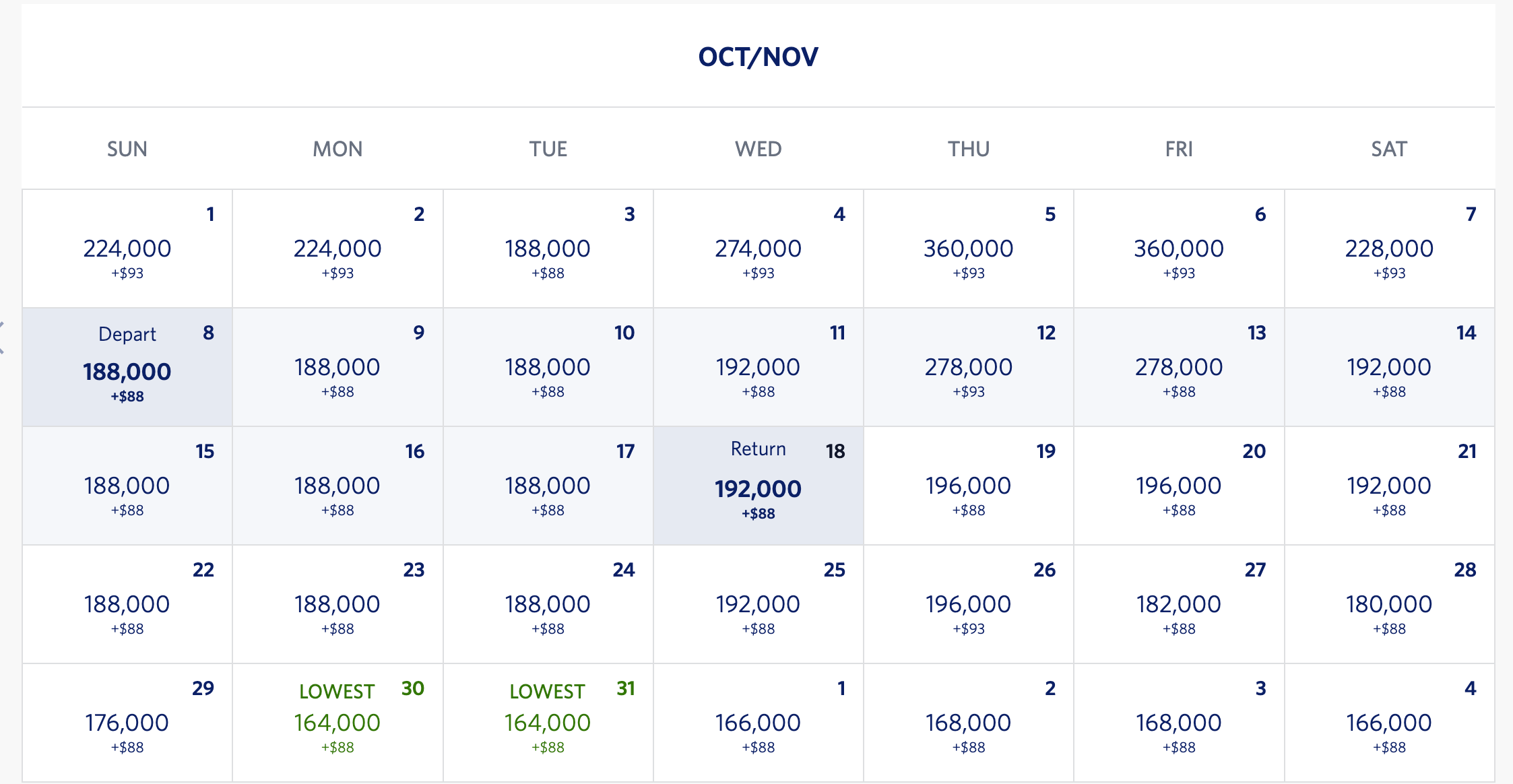
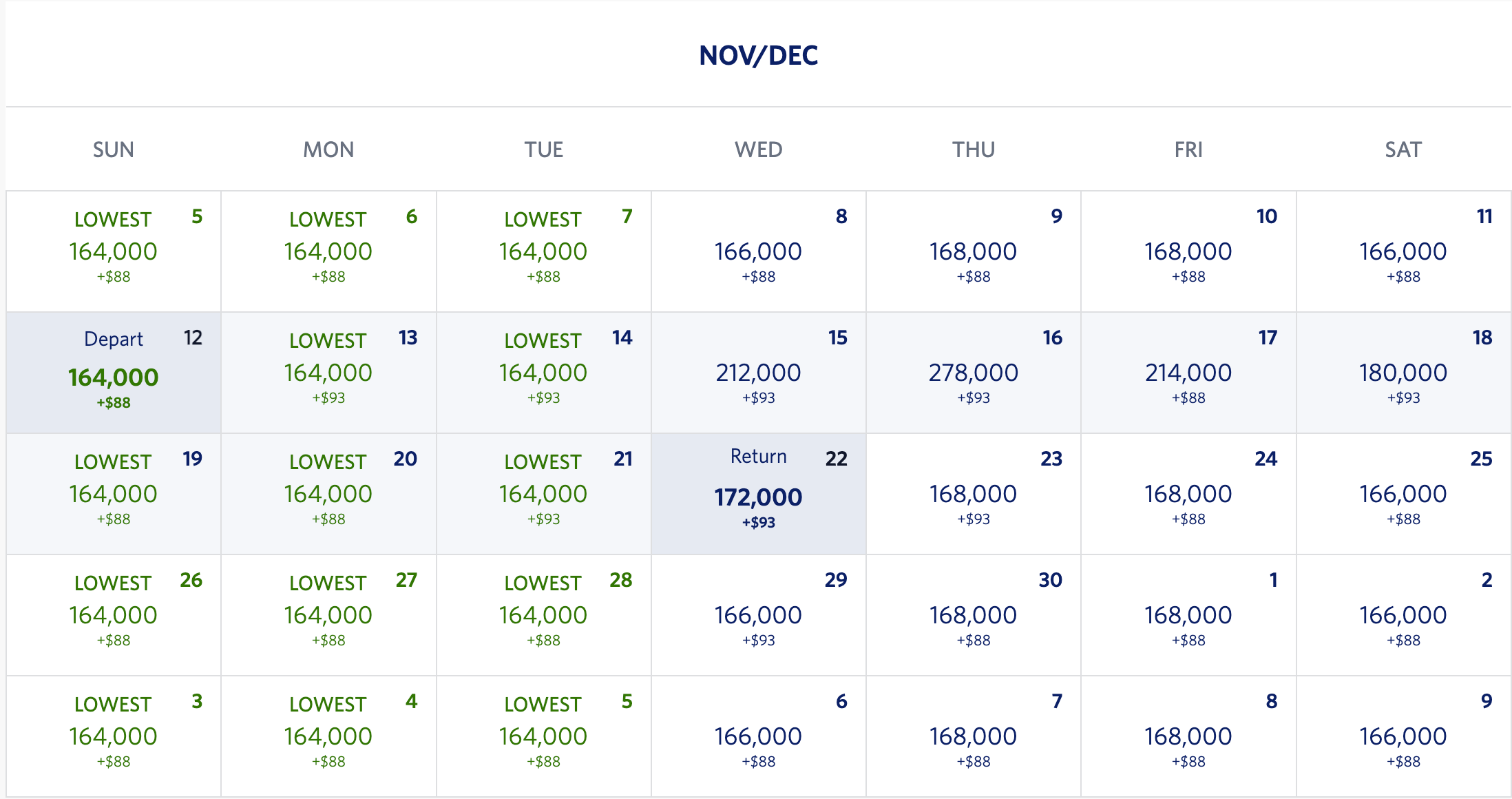
Flying Blue uses dynamic pricing. Below are ranges of airfare and award redemptions in all three cabins for flights from Chicago to Paris through December.
| Round-trip prices | Economy | Premium economy | Business class |
| Airfare | $597-$1,117 | $1,462-$2,691 | $2,217-$4,241 |
| Flying Blue miles + taxes/fees | 22,500-111,500 miles plus $204-$216.54 | 45,000-299,500 miles plus $270 | 175,000-567,000 miles plus $346-$348 |
Flying Blue is the loyalty program of Air France and KLM. You can redeem Flying Blue miles for SkyTeam airlines, including Delta. It’s a popular currency to transfer credit card points to, as they often have the best SkyTeam redemption rates.
For example, you can transfer points from the following programs to Flying Blue:
- American Express Membership Rewards
- Bilt Rewards
- Capital One miles
- Chase Ultimate Rewards
- Citi ThankYou Rewards
- Marriott Bonvoy to Flying Blue at a 1:1 ratio, excluding Marriott Bonvoy, which transfers at a 3:1 ratio plus a 5,000-mile bonus awarded for every 60,000 Marriott points transferred.
Travelers can also earn 3 Flying Blue miles per dollar spent on SkyTeam airfare purchases bought directly with a SkyTeam airline and 1.5 Flying Blue miles per dollar otherwise with the Air France-KLM World Elite Mastercard®. This card currently offers a welcome bonus of 70,000 miles after spending $2,000 on the card in the first three months of account opening, which is worth $840 based on TPG valuations plus a $100 statement credit.
Checking into premium economy on Air France
Premium economy passengers are entitled to use the SkyPriority premium check-in areas at airports. Though Chicago O’Hare International Airport (ORD) was very busy on a Sunday at approximately 3 p.m., there was no line at the SkyPriority counters. I passed through TSA security quickly thanks to TSA PreCheck and Clear, for which Air France flyers are eligible if they’ve enrolled in either program.
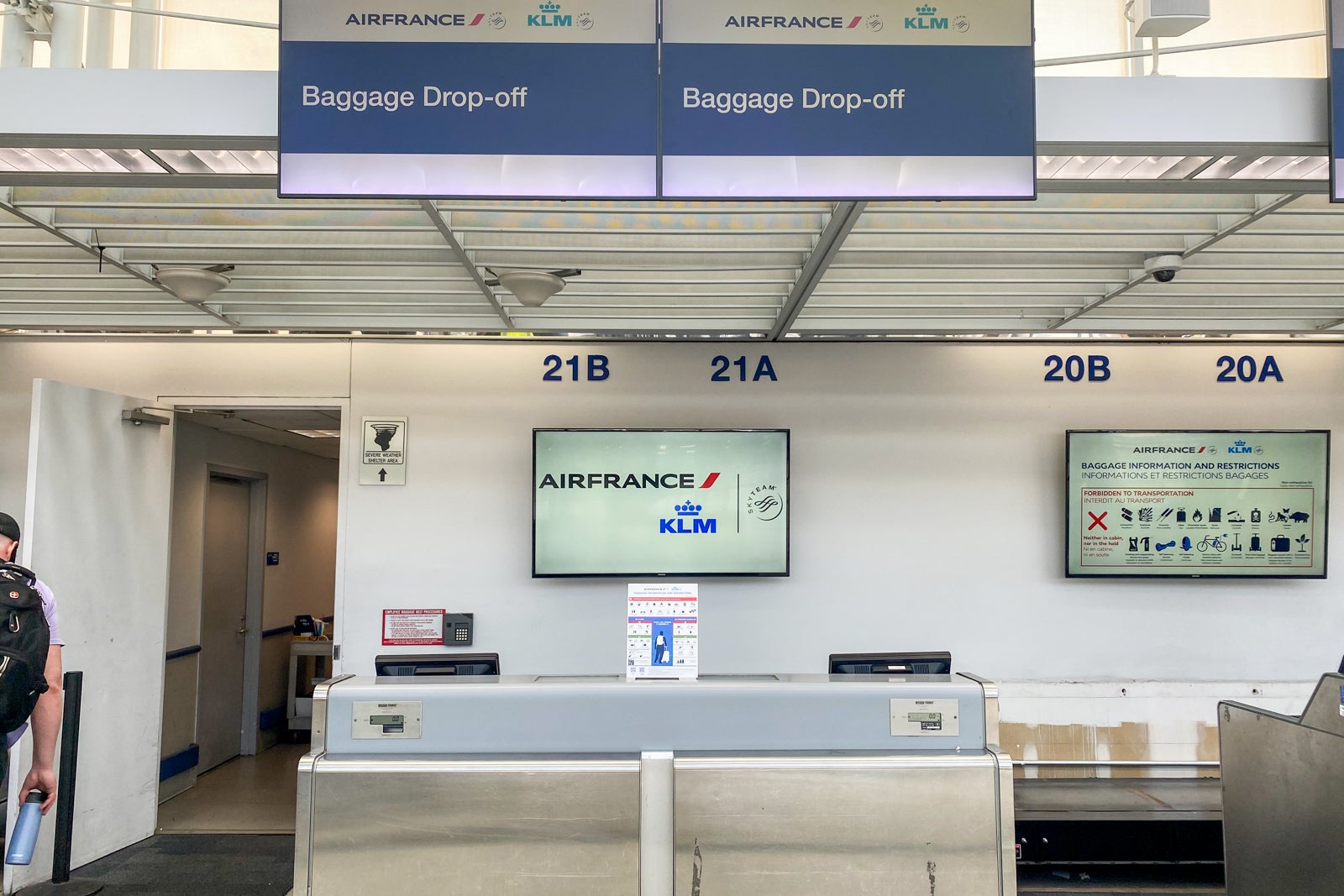
Premium economy passengers are allowed two personal items, one smaller carry-on item (up to 26.4 pounds) and one checked bag weighing up to 50 pounds. Economy passengers get one personal item, one smaller carry-on item and one checked bag.
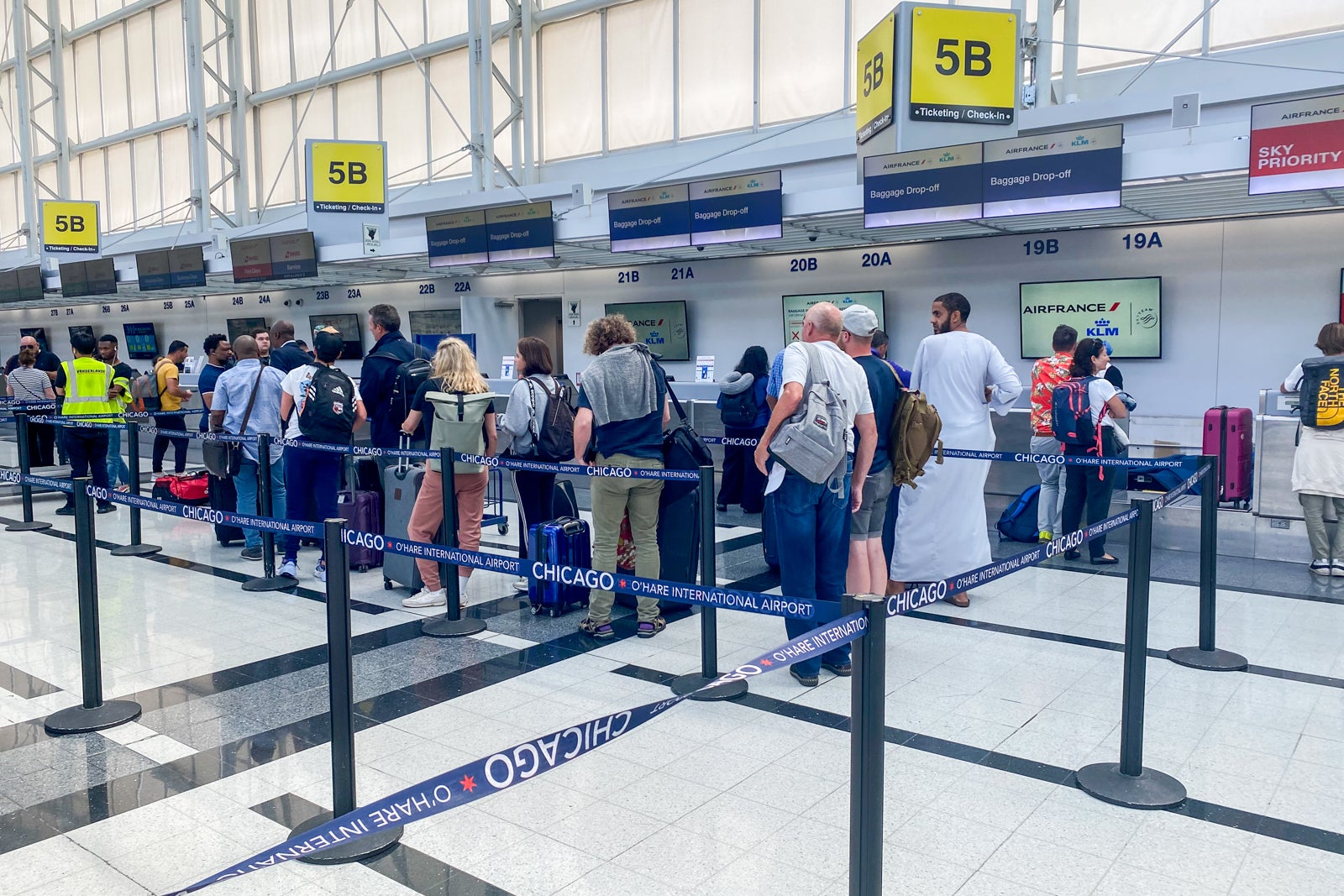
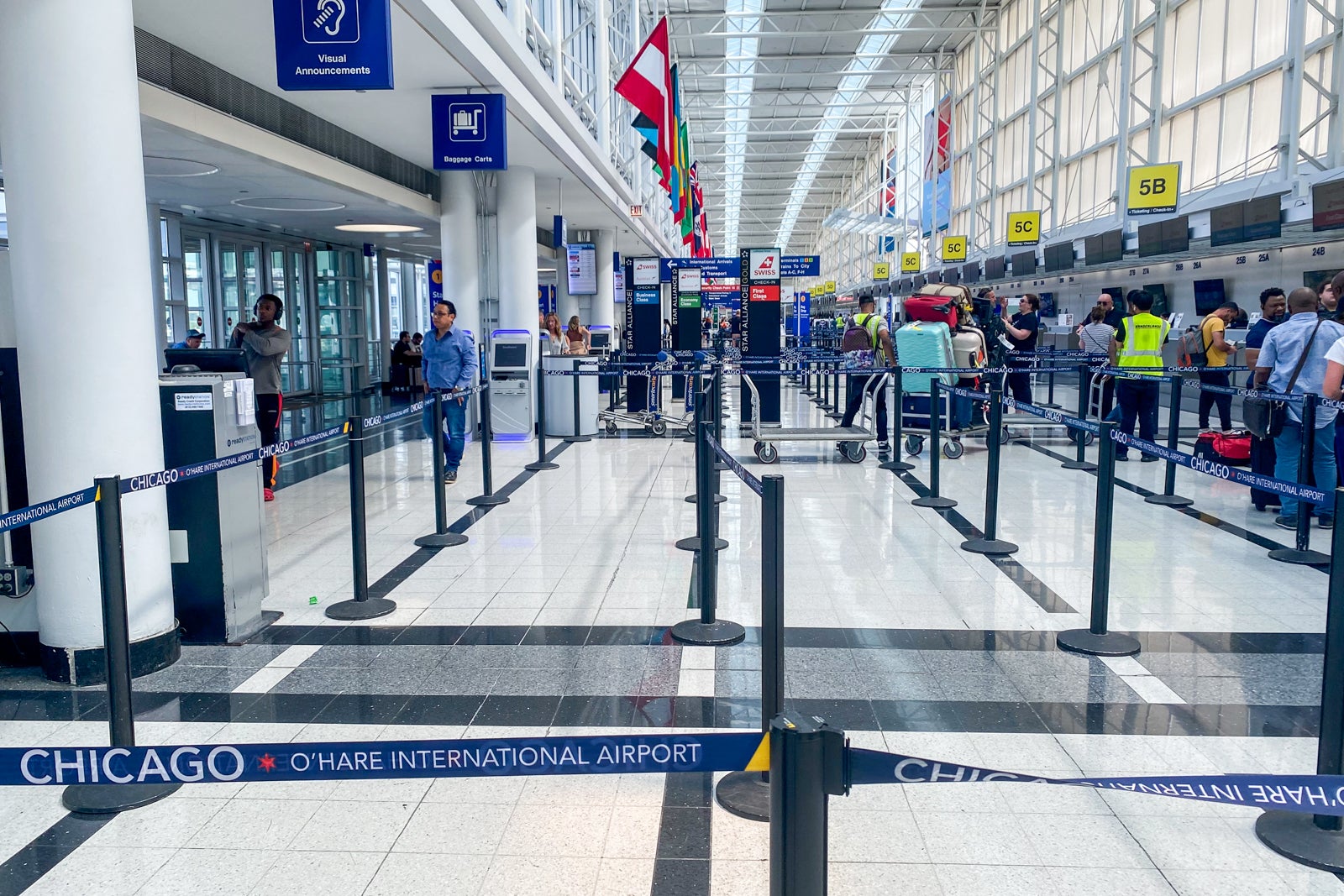
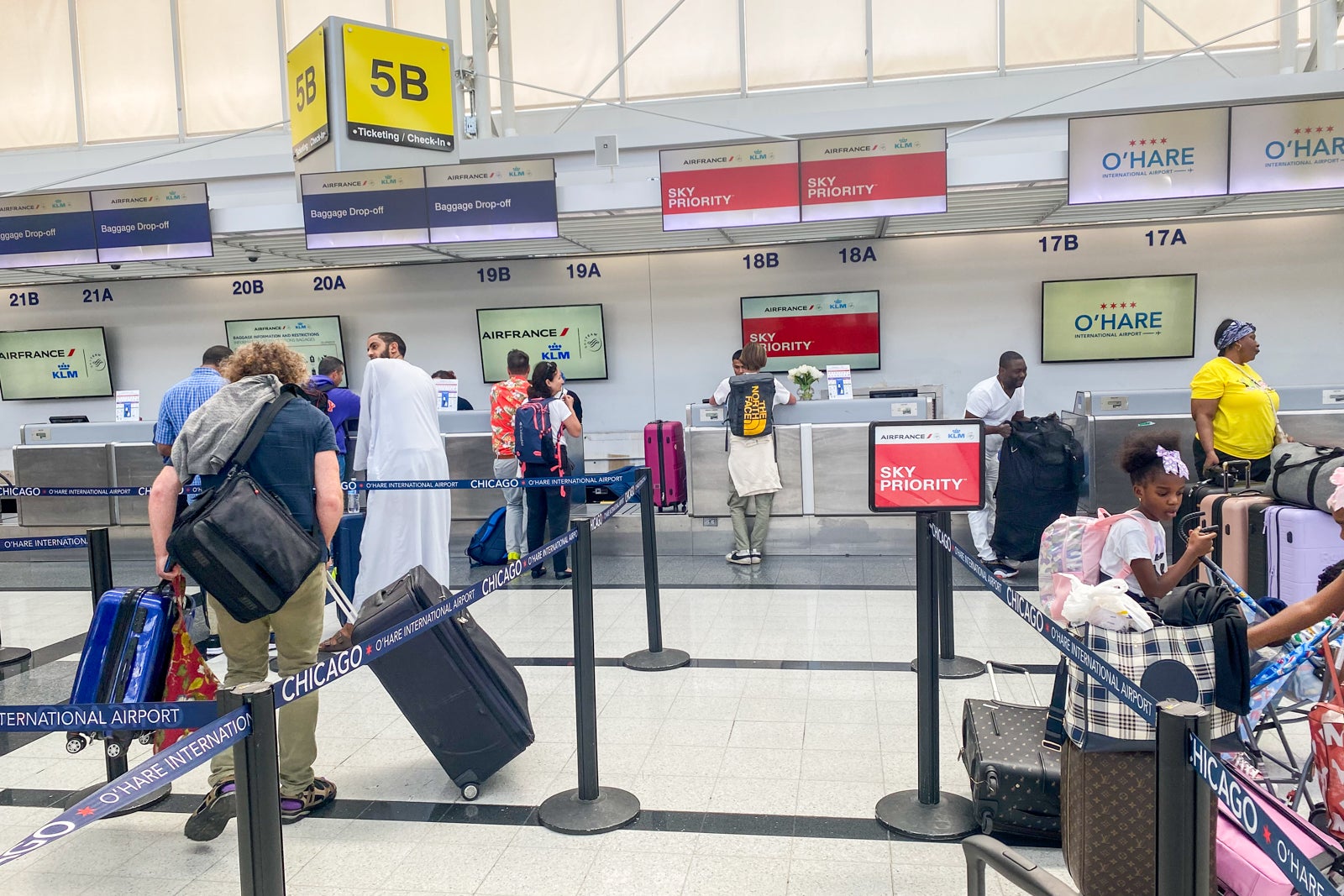
Typically, Air France boarding occurs as follows:
- Zone 1: First and business-class passengers, plus Flying Blue Platinum and Gold members flying those classes
- Zone 2: Platinum and Gold members in premium economy
- Zone 3: Silver members
- Zone 4: Premium economy passengers
- Zone 5/6: Economy passengers
Those flying in premium economy don’t receive lounge access, but Air France passengers can purchase a daypass to the airline’s lounges at select airports.
Here’s a closer look comparing Air France economy versus premium economy offerings:
| Air France cabin | Priority check-in | Luggage | Boarding group | Seat selection | Lounge access |
| Economy | No | Two personal items, one smaller carry-on and one checked bag | Group 5 | Free | No |
| Premium economy | Dedicated SkyPriority premium check-in lane | One personal item, one smaller carry-on and one checked bag | Group 4 | Free | No |
How comfortable was premium economy on Air France?
As mentioned in the editor’s note at the start of this story, I accepted a generous onboard upgrade I was offered during boarding. After taking some photos, I went from coach to the premium economy cabin, which contained 21 seats in a 2-3-2 configuration in three rows.
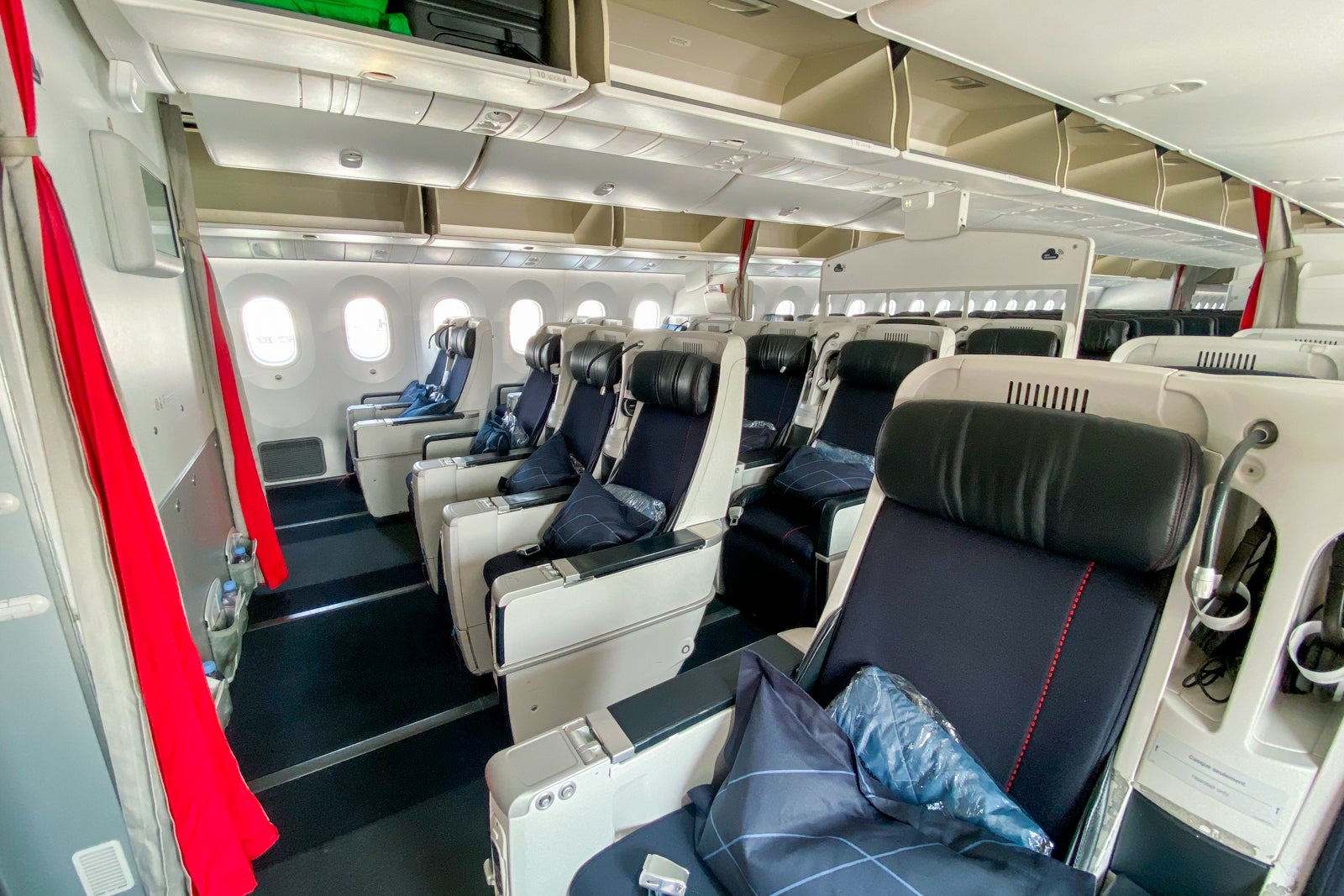
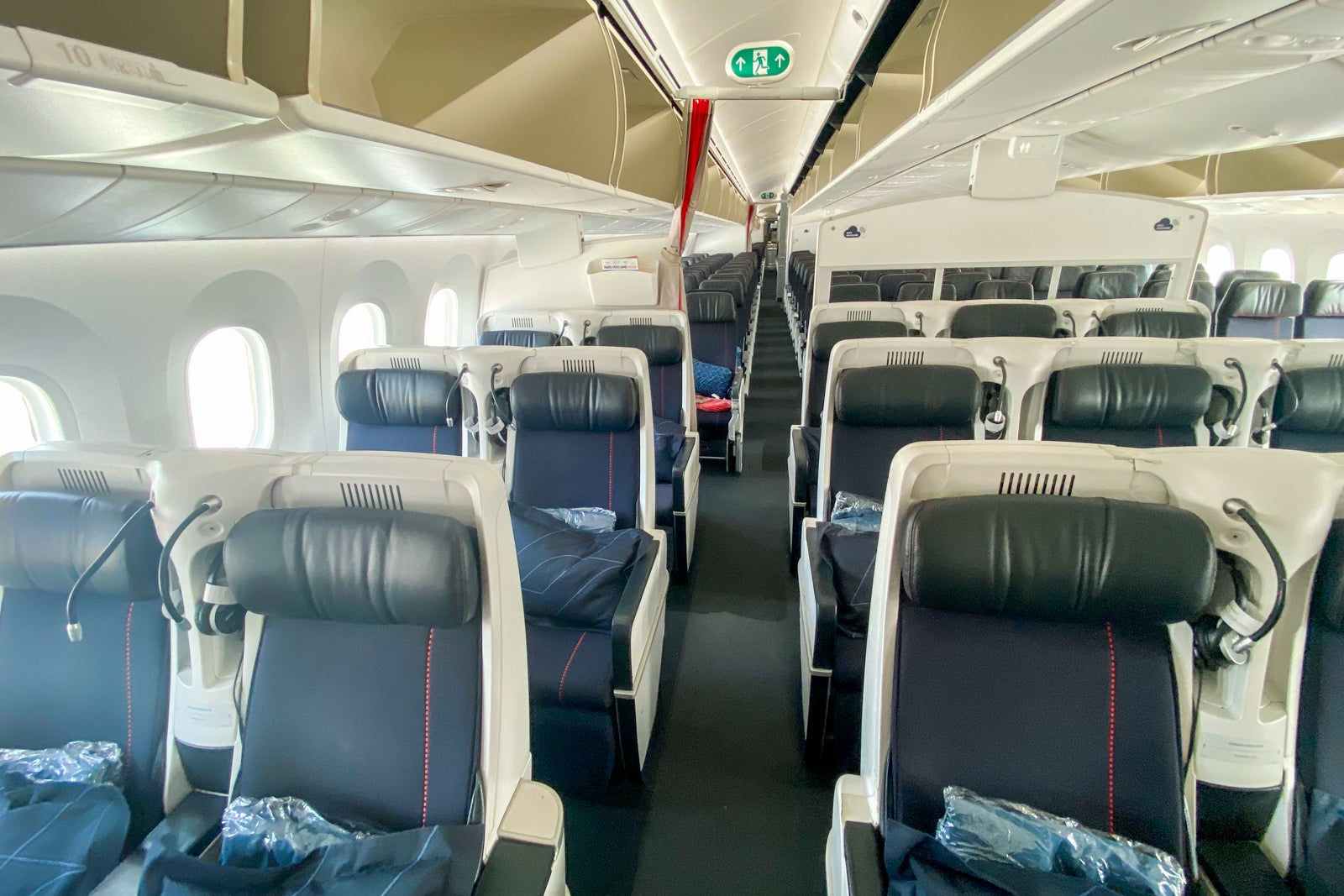
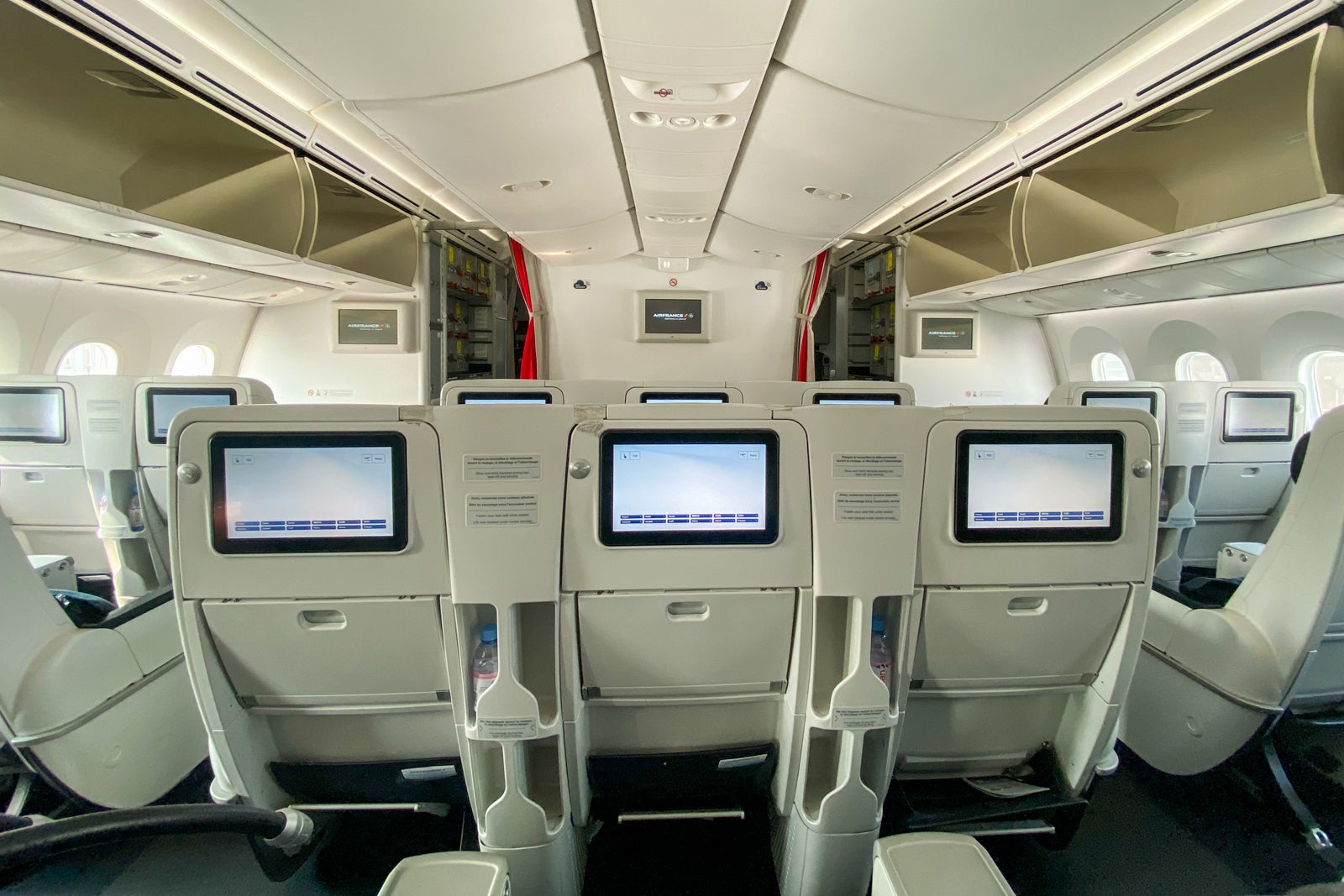
When flying Air France’s Boeing 787-9s, you can expect the below measurements in terms of layout, seat pitch, seat recline, seat width and screen size in economy, premium economy and business class:
| Economy | Premium | Business | |
| Layout | 3-3-3 | 2-3-2 | 1-2-1 |
| Seat pitch | 31 inches | 40 inches | 78 inches |
| Seat recline | 5 inches | 8 inches | Fully flat |
| Seat width | 17 inches | 19 inches | 20 inches |
| Screen size | 11 inches | 12.1 inches | 15.6 inches |



The additional 9 inches of legroom and 2 inches of extra width compared to economy — plus a few extra inches of recline — certainly made the premium economy seats feel more spacious than coach seats. I could recline the seat and raise the legrest by pressing the buttons on the left armrest of the seat.
My bulkhead seat (12D) allowed me to stretch out my legs fully (and I’m 5 feet, 10 inches). Even with this extra space, the seat’s fixed-shell design (a seat that slides down and forward within the space of the seat versus having its back recline into the space of the seat behind) did not facilitate extra comfort or sleep for me personally.
The cotton upholstery, in Air France’s signature navy blue and red colors, felt more similar to domestic economy seats than premium seats.
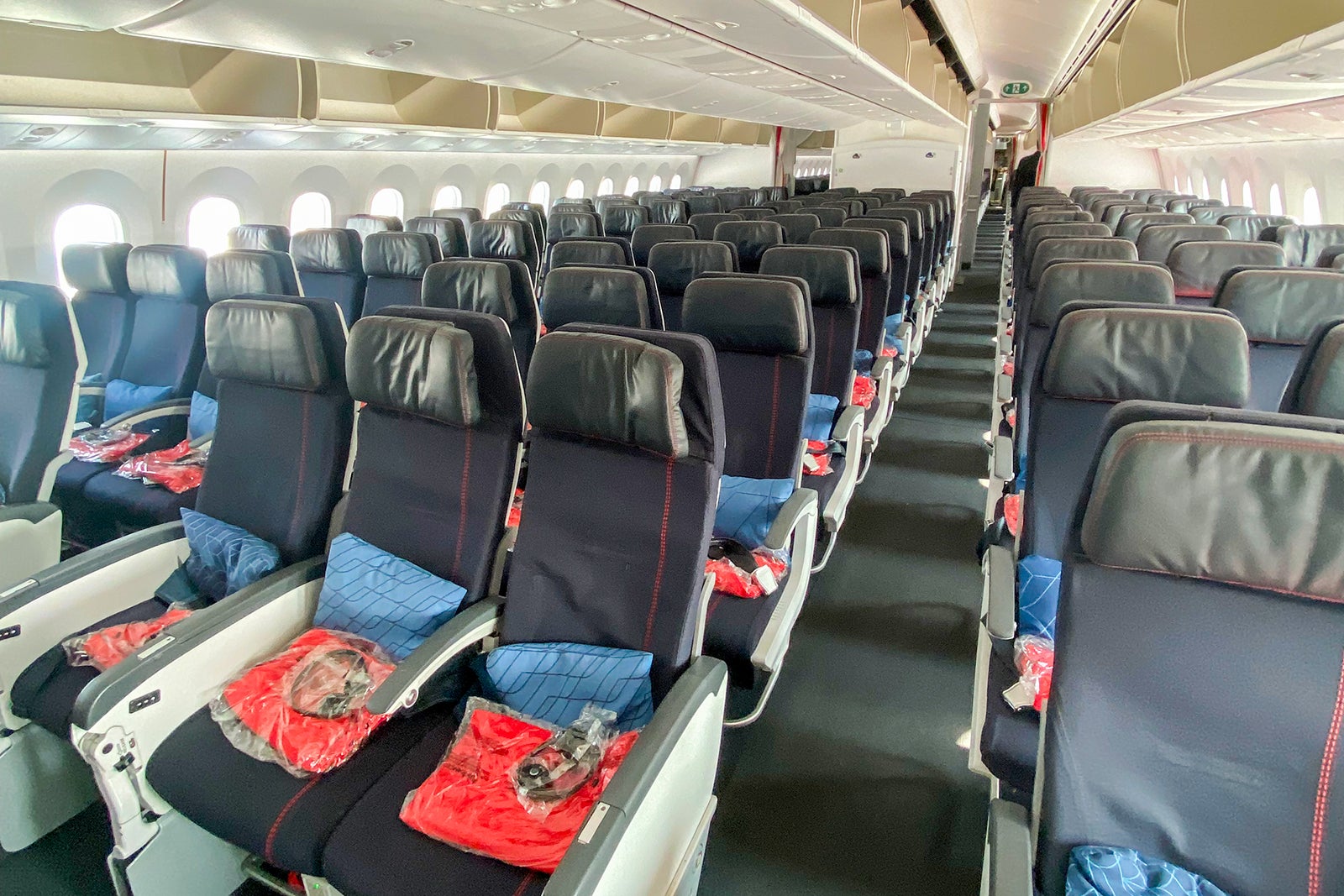
The two non-bulkhead rows of premium economy have footrests and an under-seat area, but the bulkhead seats only have a legrest. Even so, mine was comfortable for extending my legs to their full length.
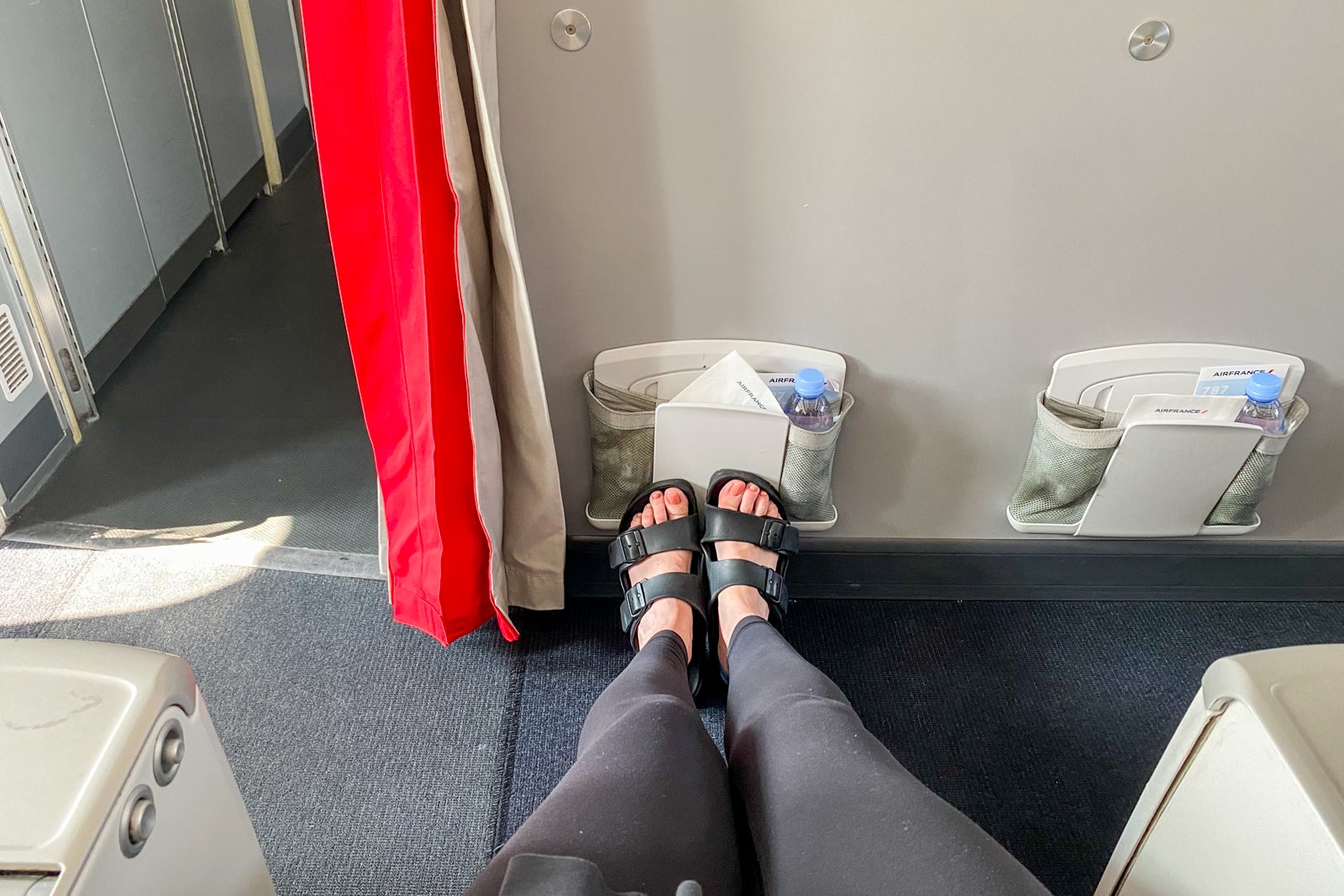
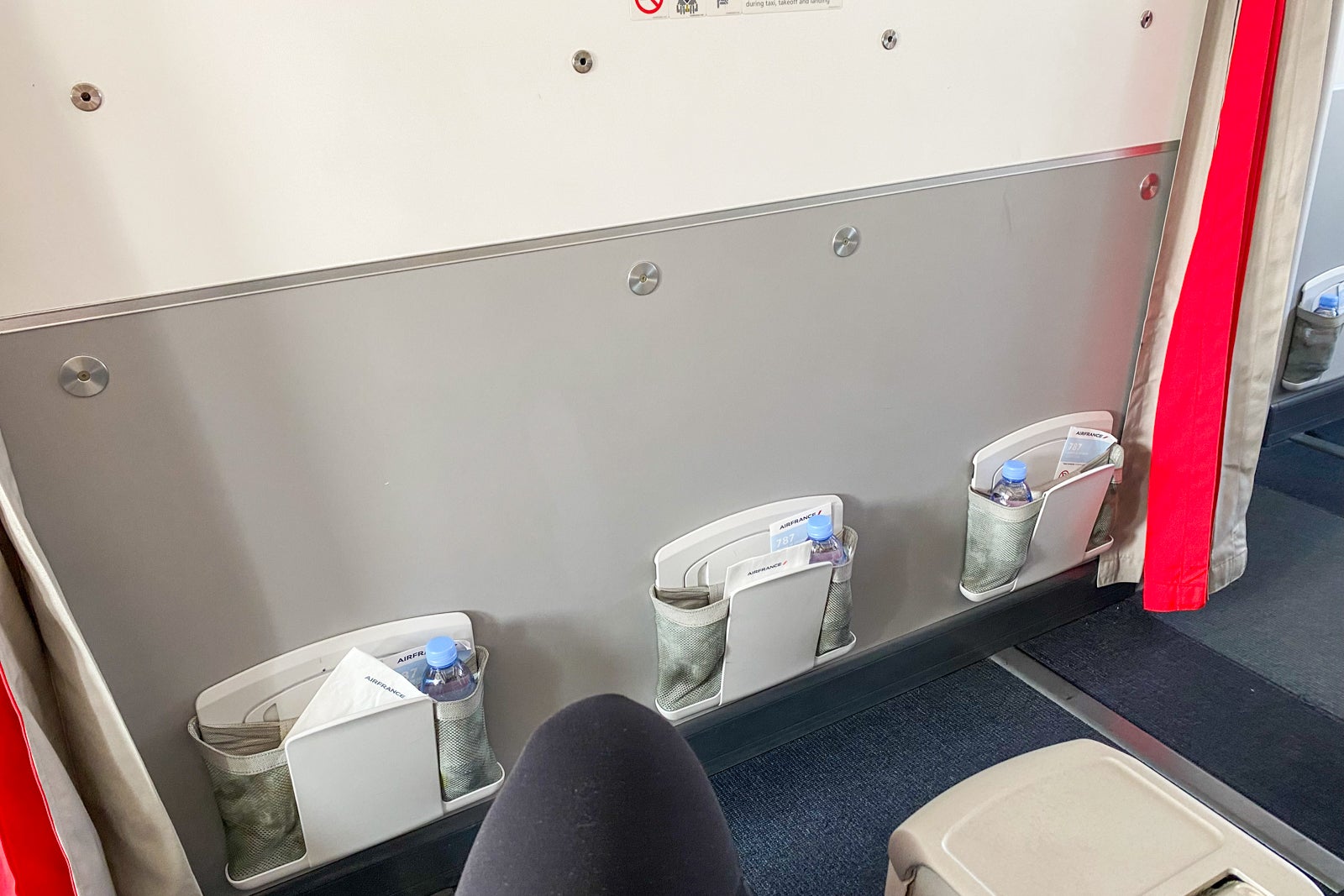
In terms of design, the economy seats don’t look much different from the premium seats aesthetically. However, the premium economy seats offer wider seats, more legroom, fewer seats across the cabin, bigger headrests, reading lamps on those adjustable poles, water bottle holders and drink trays between the seats.
Because there were overhead bins on the sides and down the middle of the cabin, there was plenty of room for everyone’s luggage, including both of my carry-on bags. It was my first time traveling with a larger carry-on duffle, and it still fit without issue.
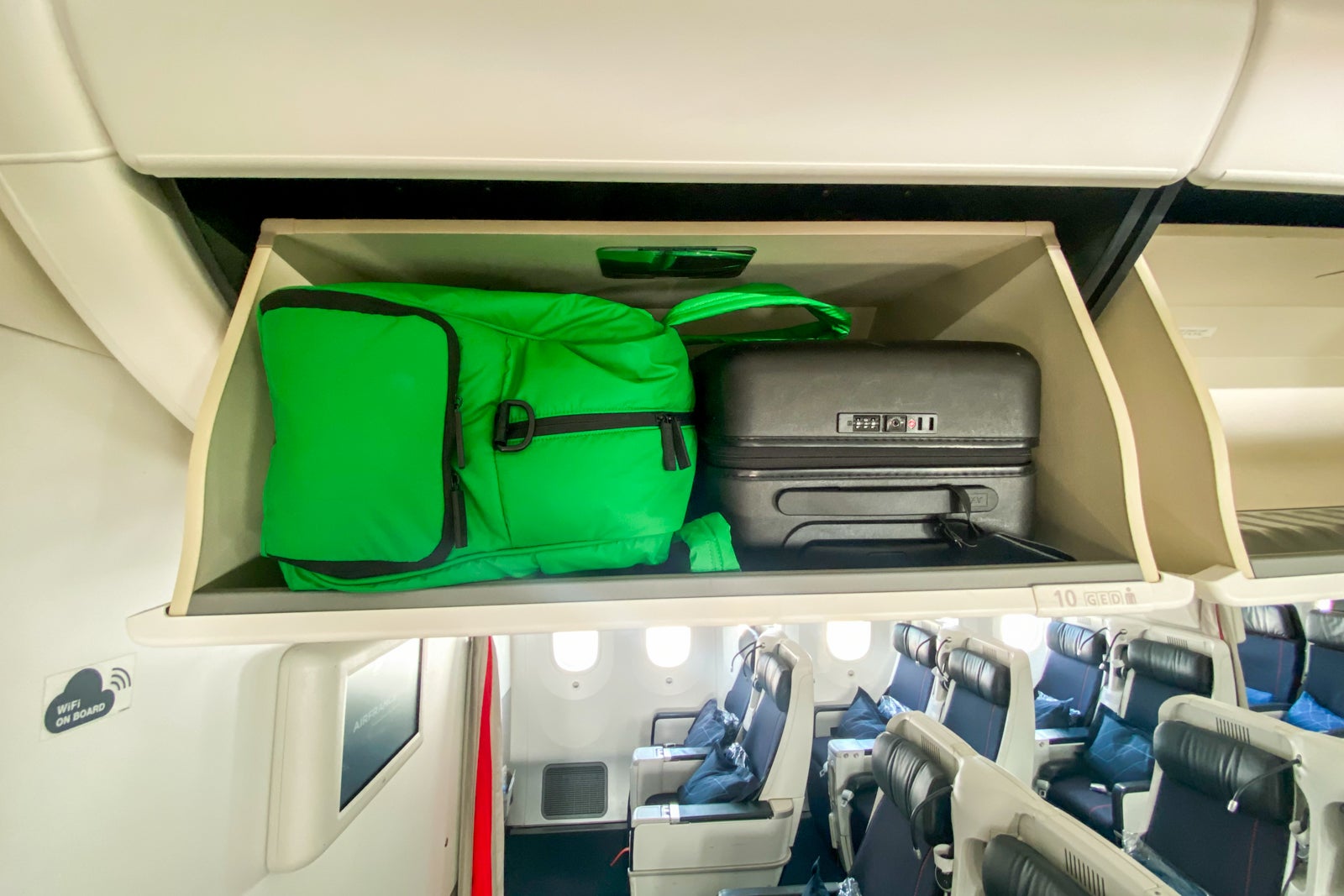
Each seat had a universal charging point embedded in the console between it and the next seat or the aisle. There was also a USB port under each inflight entertainment screen.
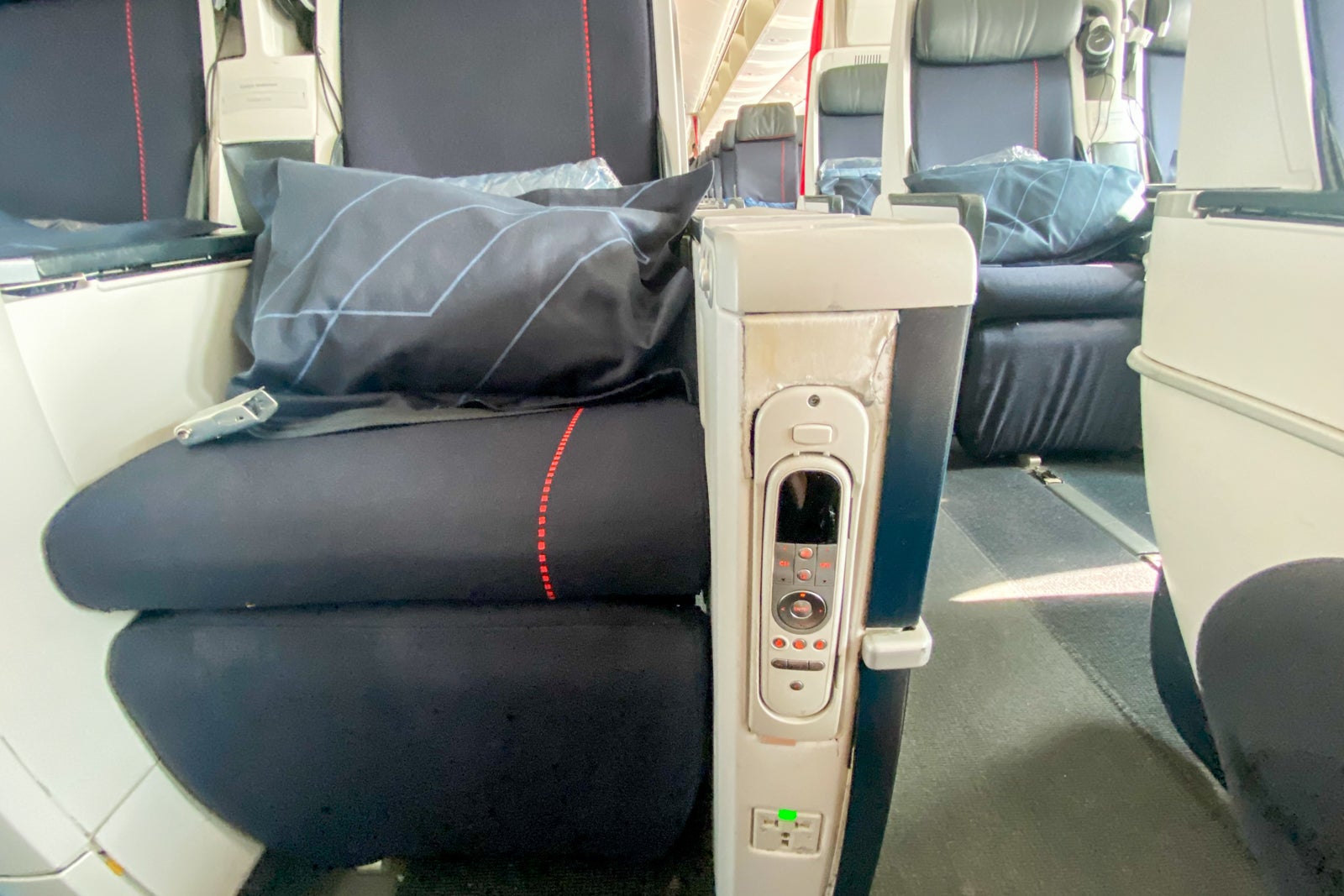
A bi-fold tray table slid from the aisle armrest to lie flat on the center console. Though it lacked a dedicated cupholder, it worked fine for meals served on a tray and was large enough to accommodate my laptop. The tables in the non-bulkhead seats also slid out of the armrests. A small storage area was on the wall in front of the bulkhead seats, holding a water bottle.
There were two lights above each seat, which you could control with the entertainment remote, but there were no individually controlled air conditioning vents.
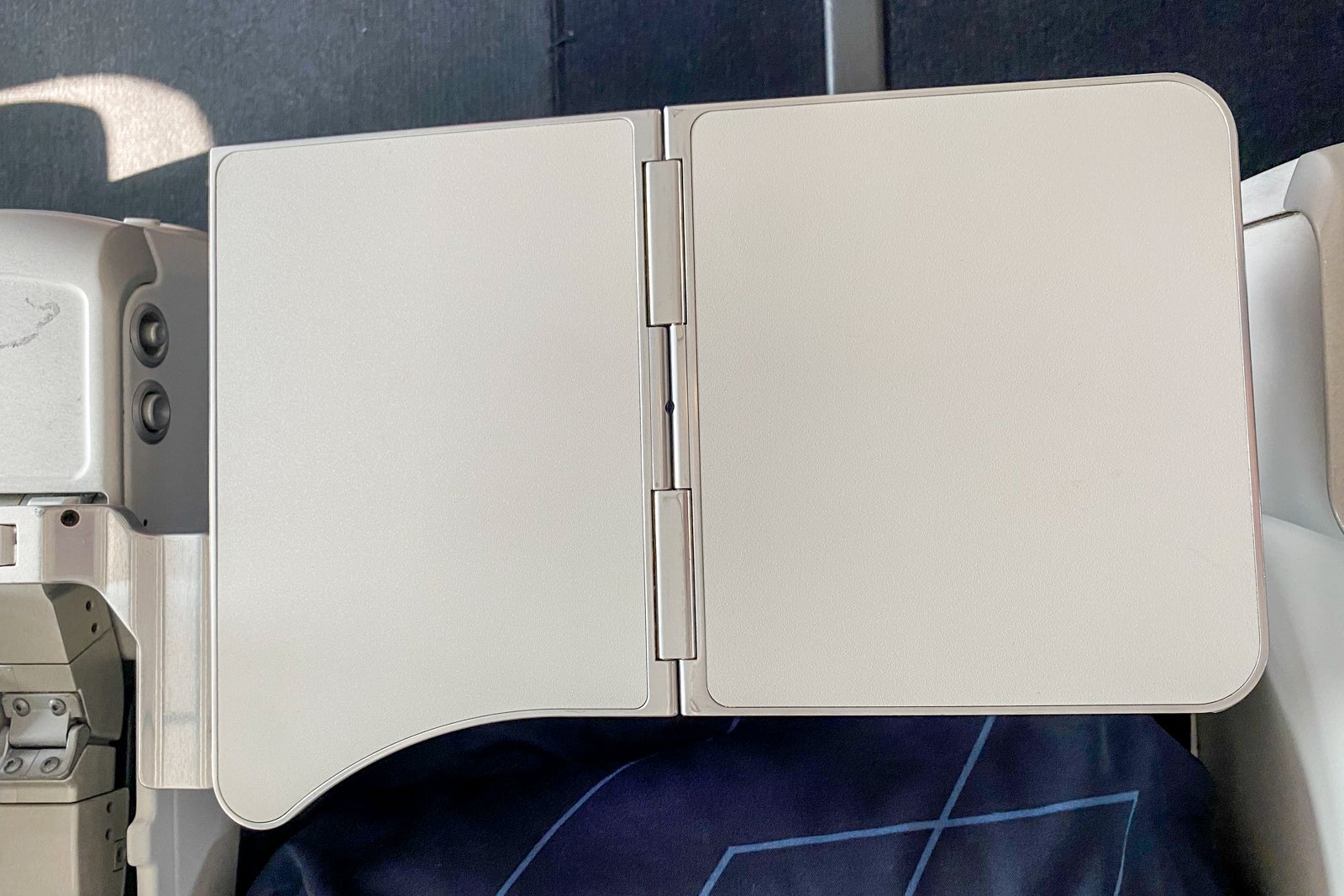
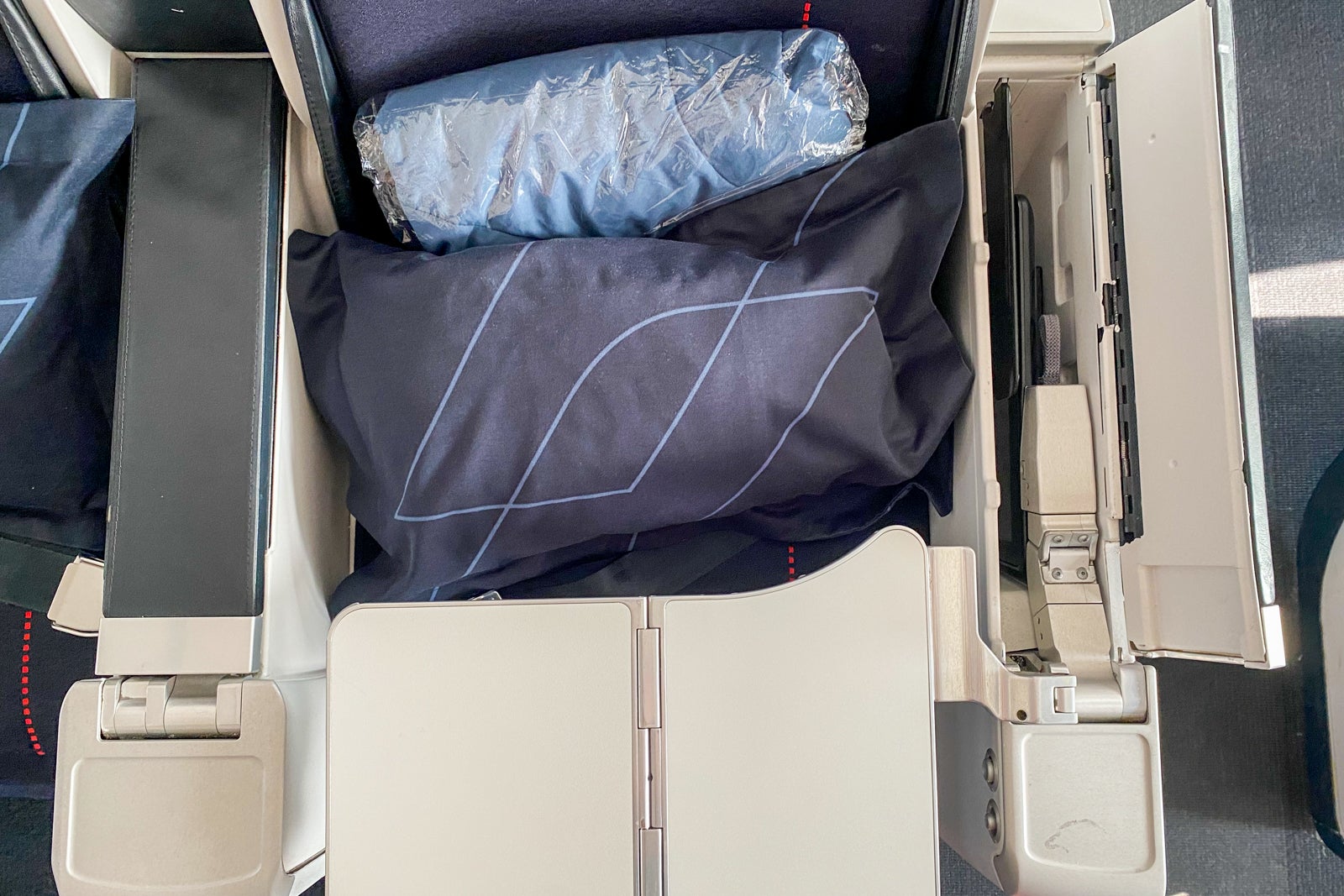
Amenities in Air France premium economy
Awaiting me on my seat were a pillow and blanket (larger and more durable than those in economy). An amenity kit and moist towelette came shortly after. There were also basic noise-canceling over-ear headphones hanging between each seat.
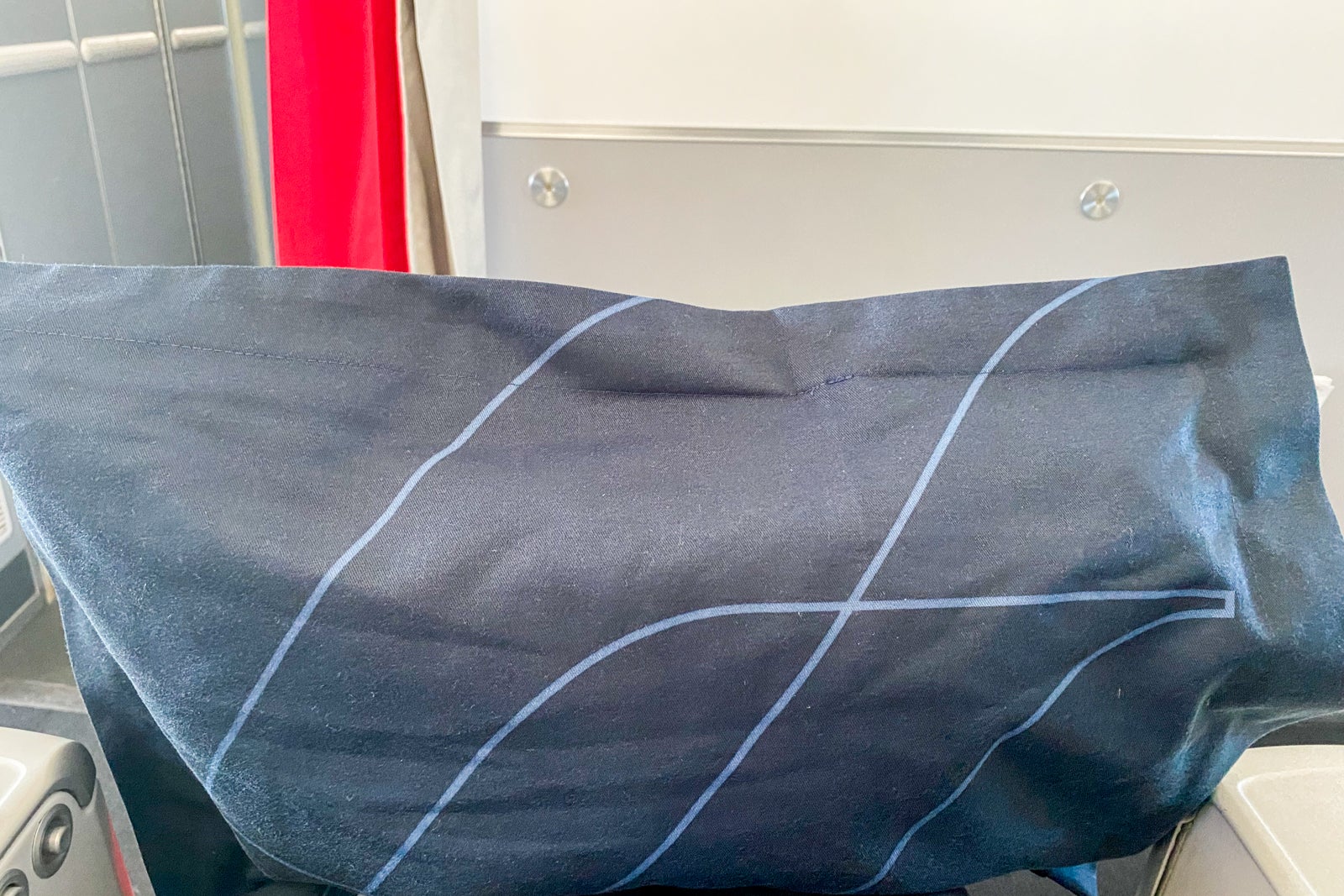
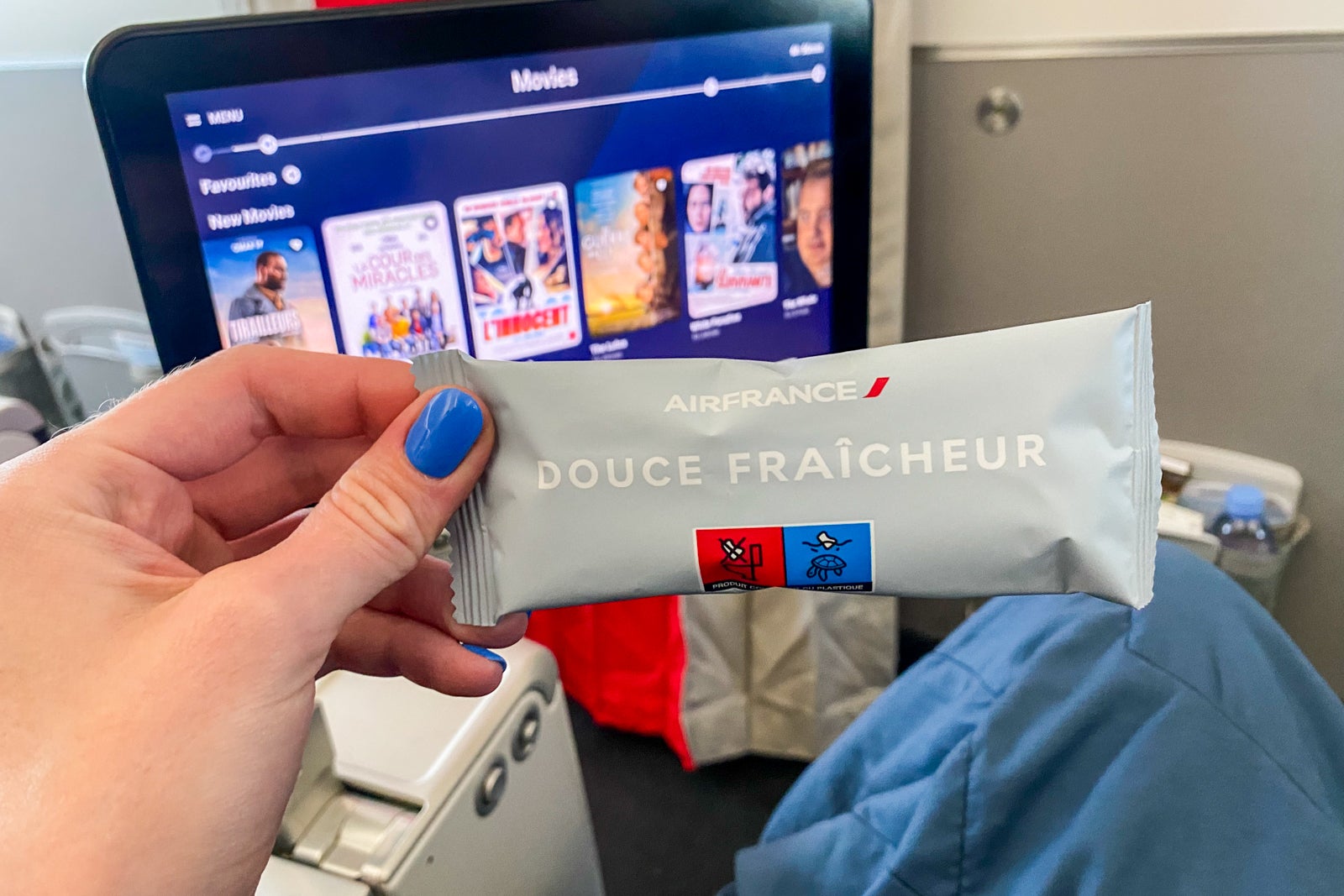
The small amenity kits contained a toothbrush, toothpaste, eyemask, socks and earplugs.
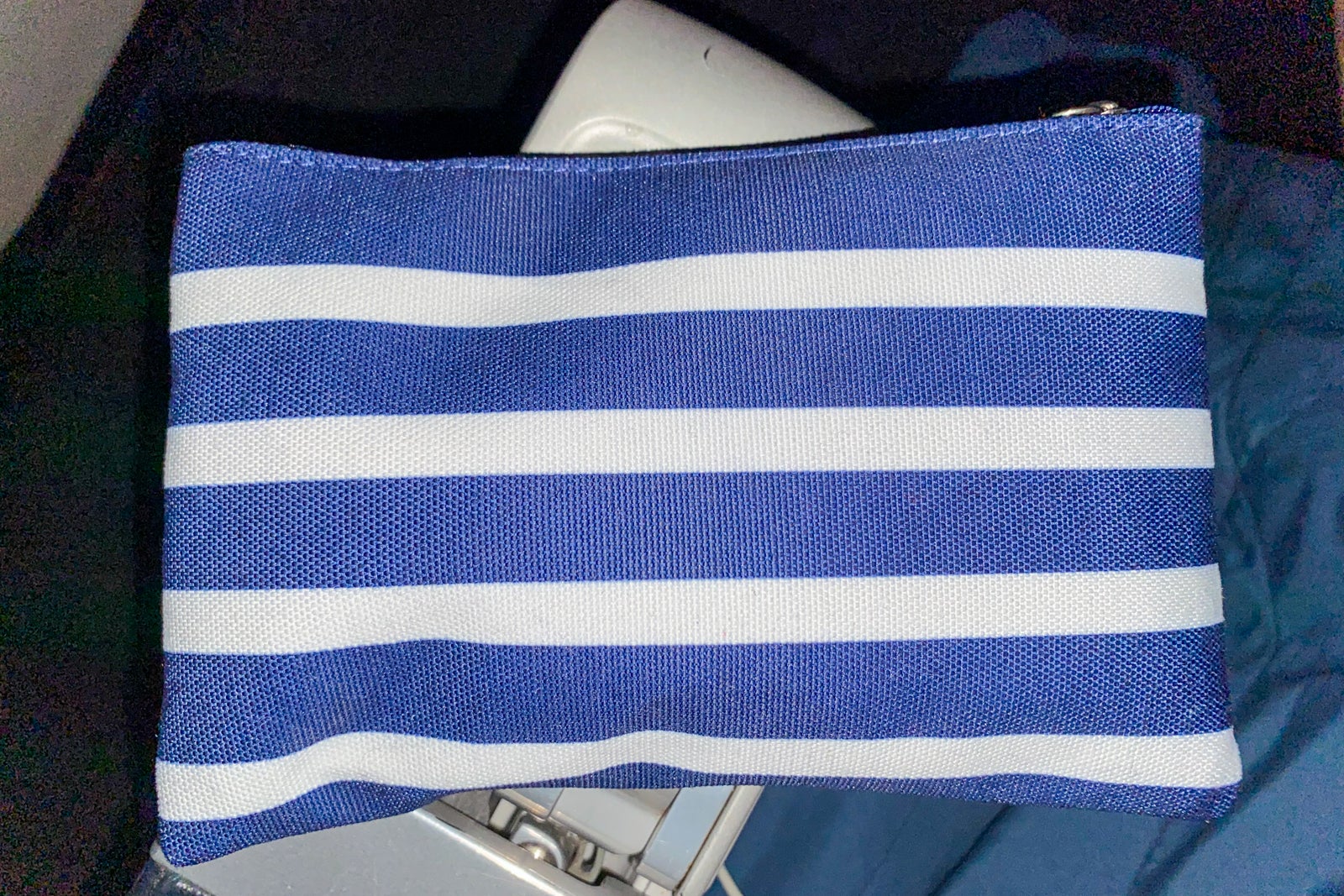
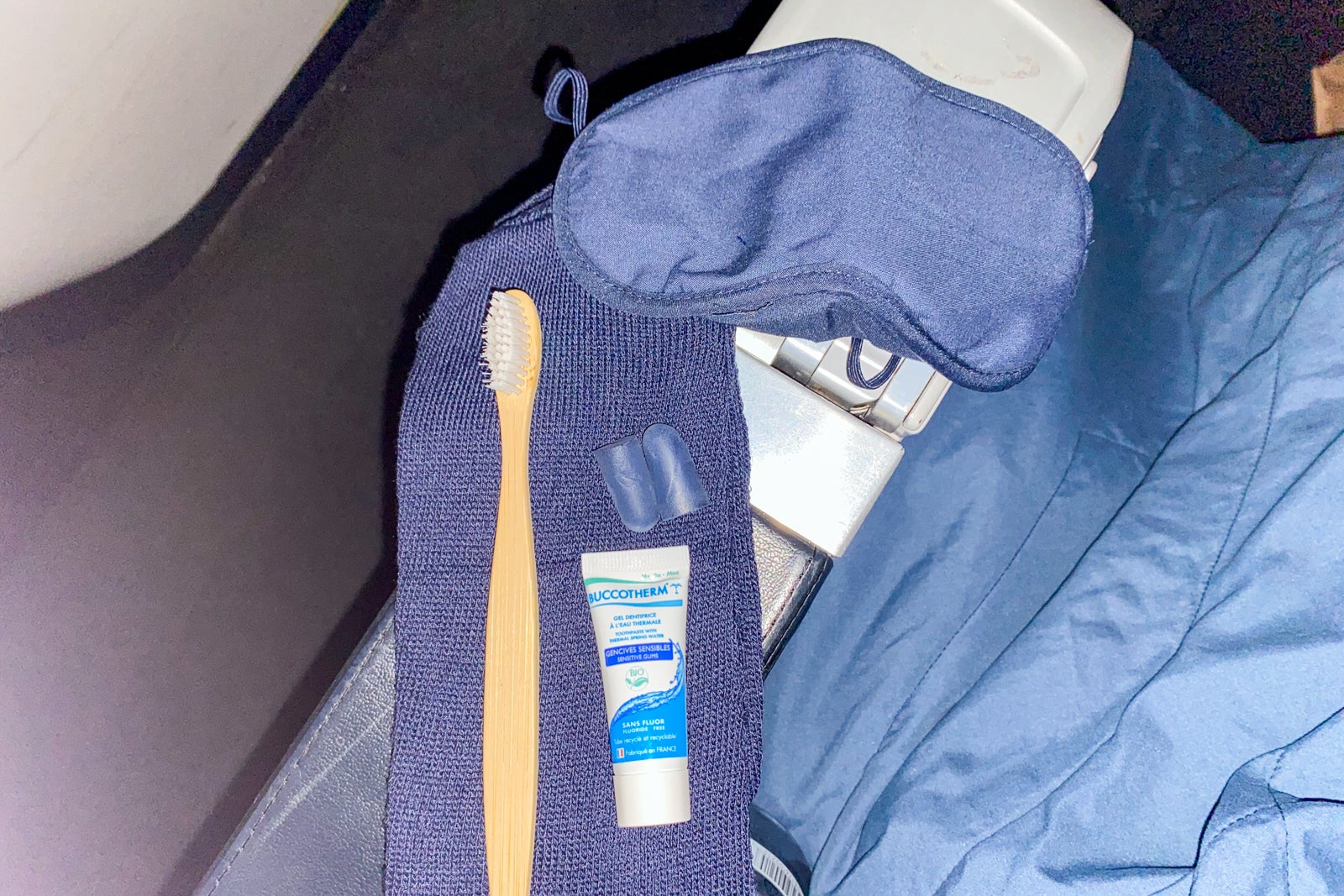
The inflight entertainment screen offered both French and American TV shows, movies and music. Entertainment options ranged from newer films like “Avatar” and “Don’t Worry Darling” to classic American series such as “Friends” and “The Fresh Prince of Bel-Air.”
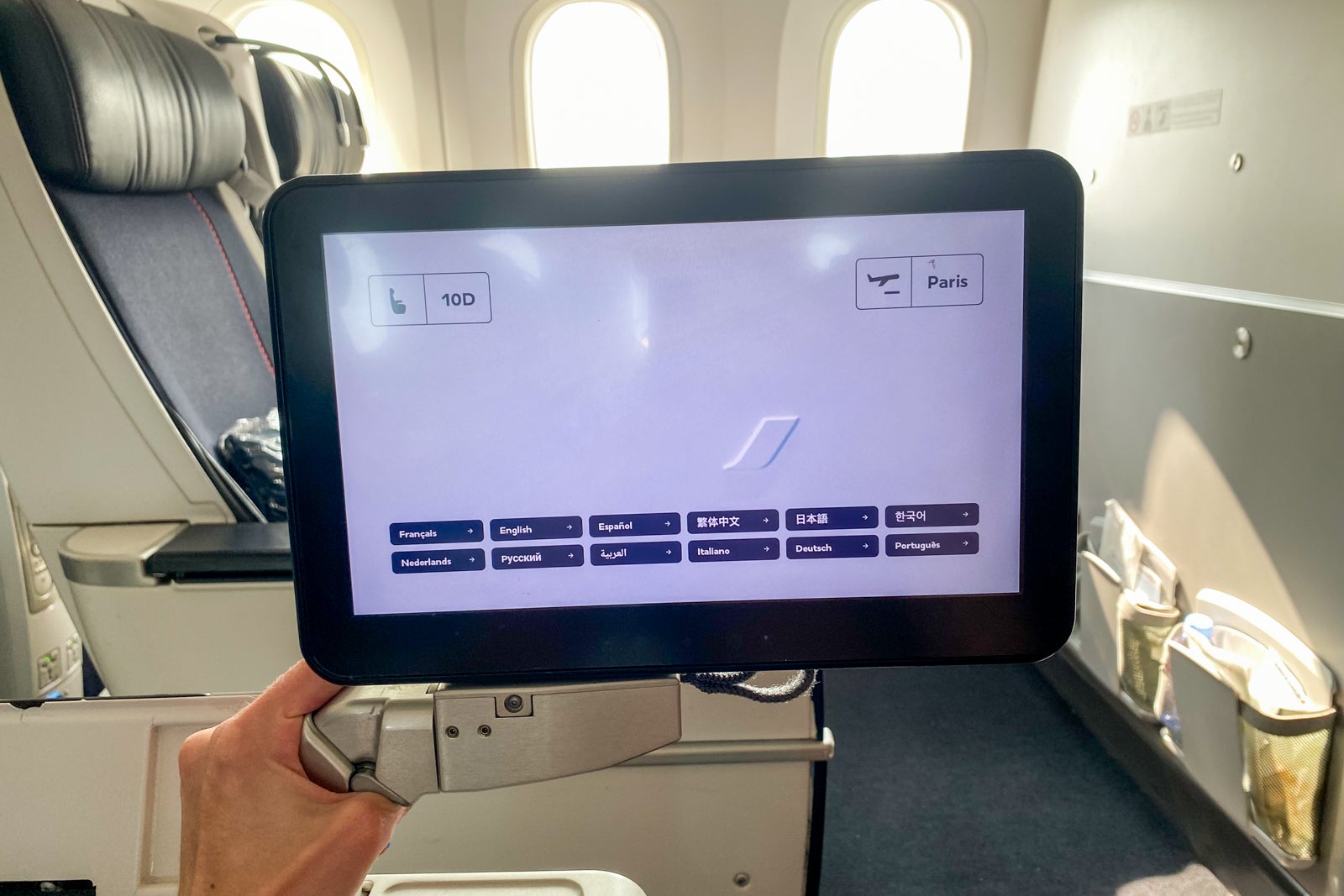
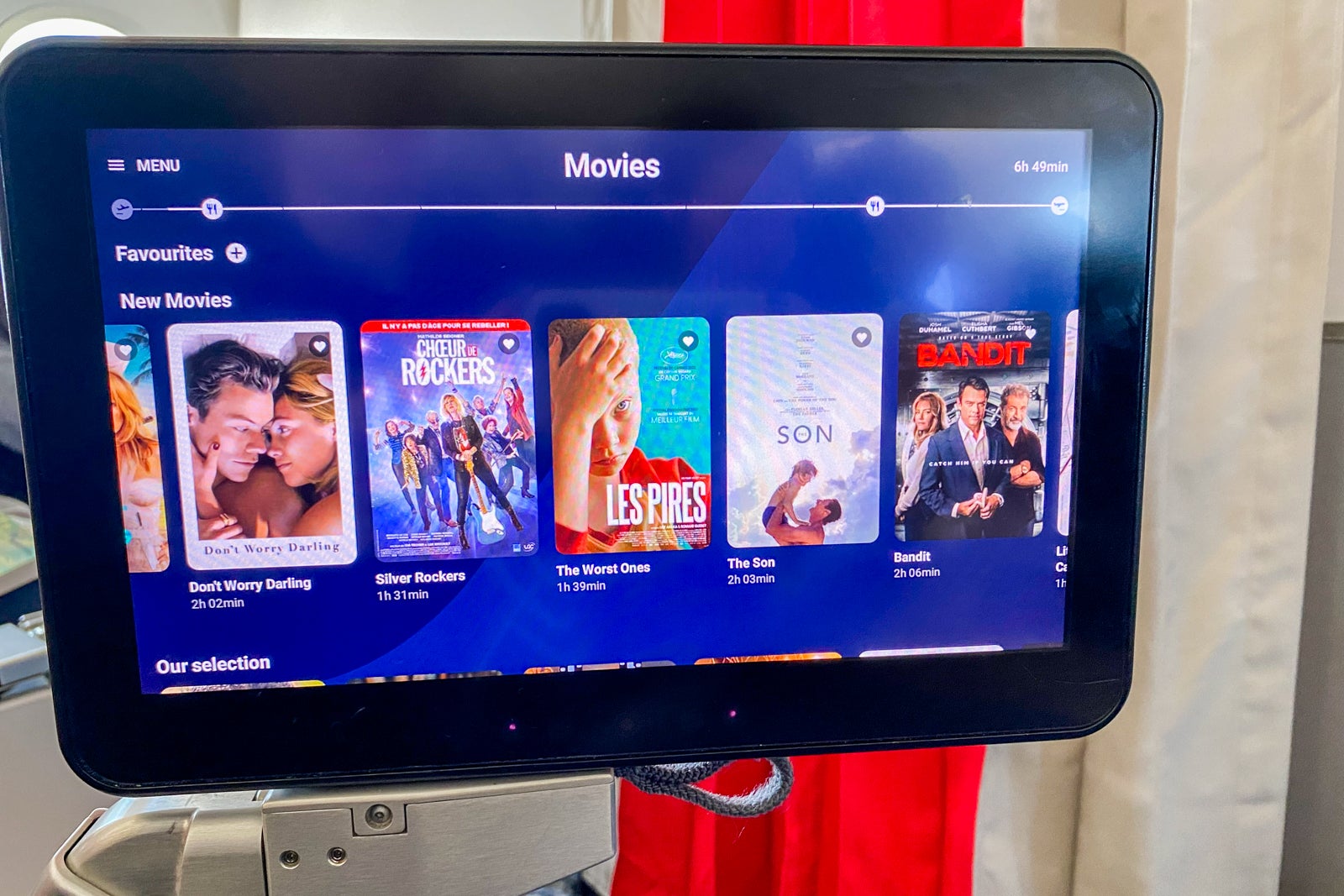
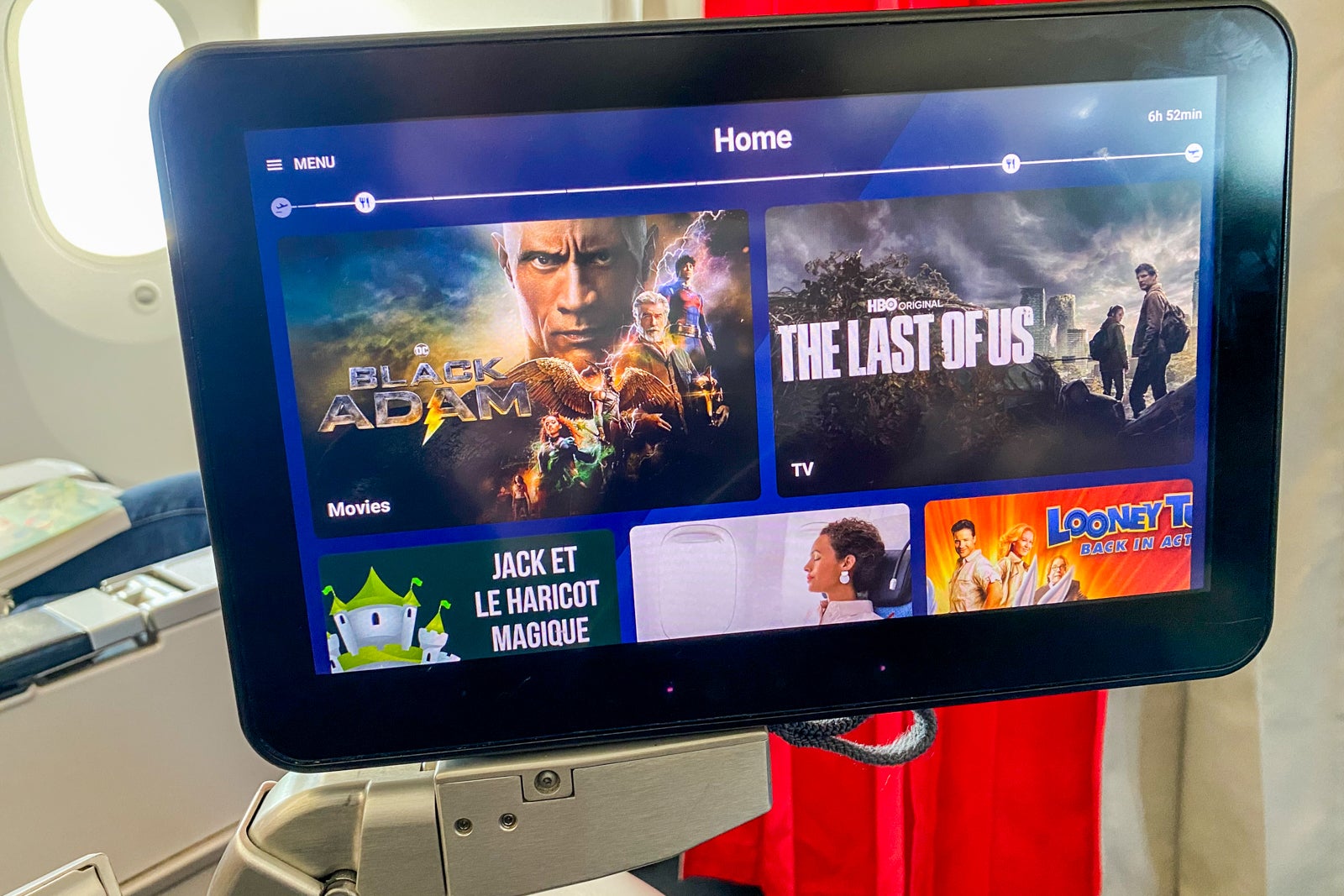
Though compatible with the provided headphones, you could also link wireless headphones to the system via Bluetooth. The headphones were noise-canceling in the sense that they blocked out background noise to a degree but not fully. So, you might want to use your own wireless headphones rather than the airline-provided ones.
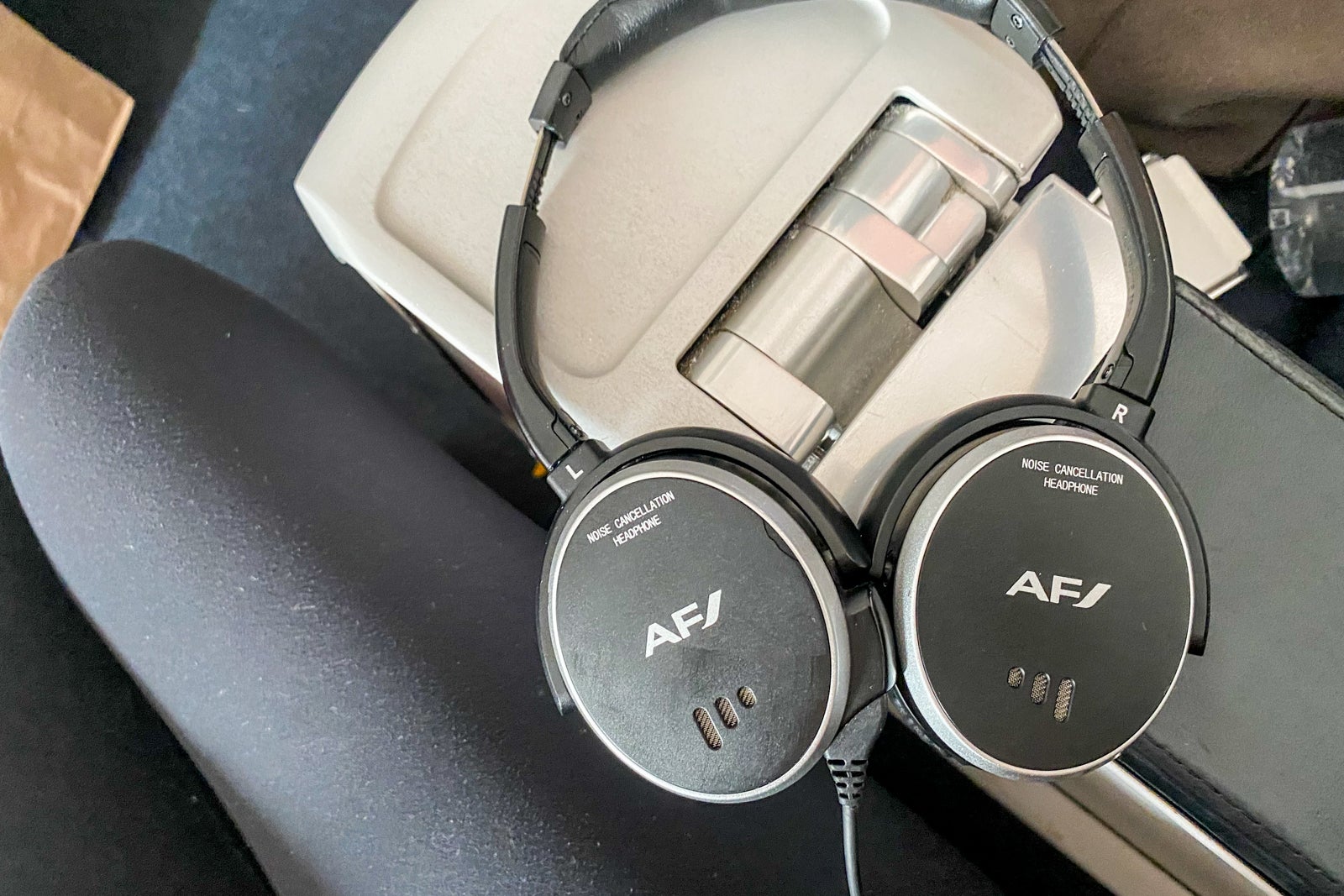
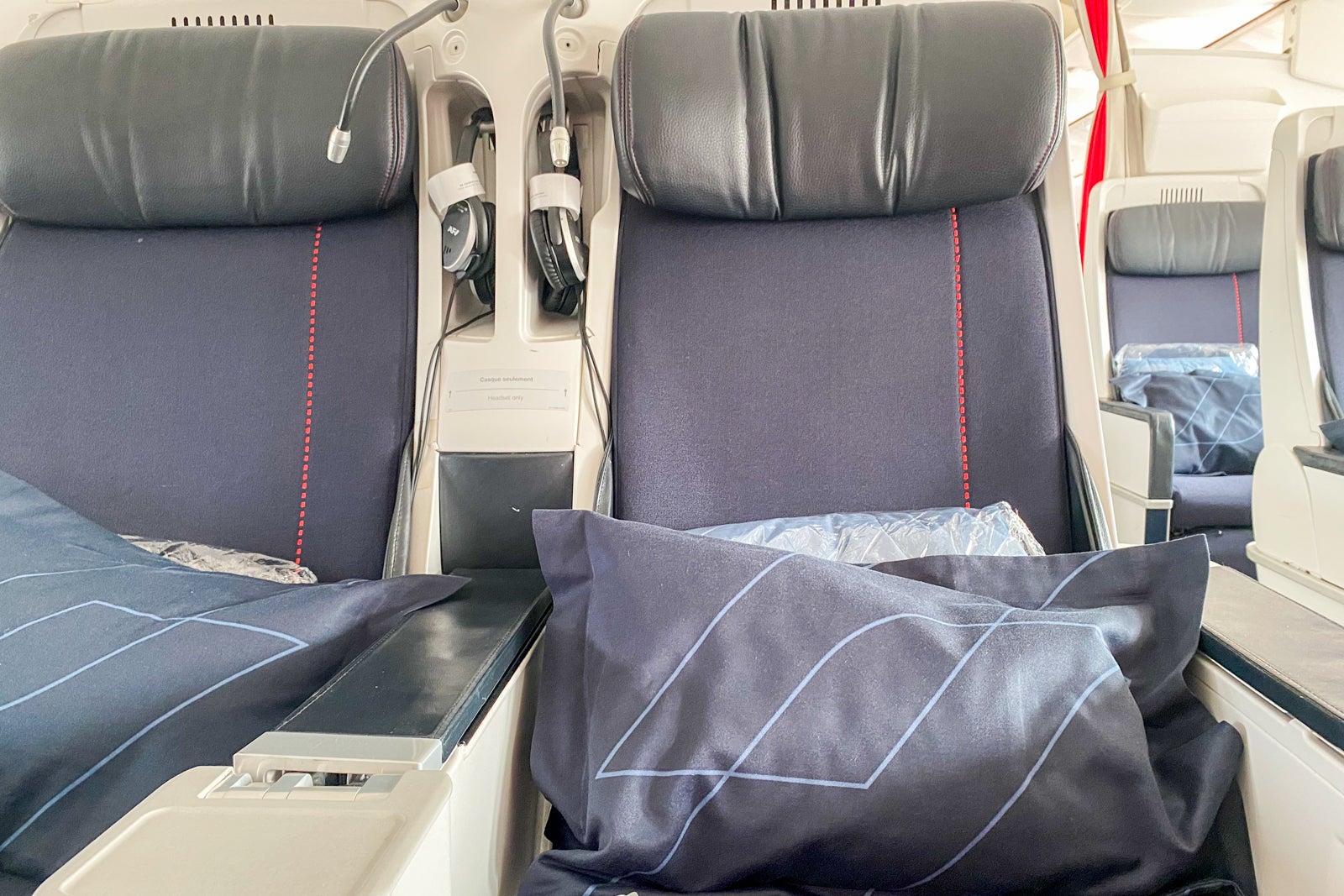
Three Wi-Fi options were available: complimentary text messaging, text messaging plus one hour of internet access for 8 euros ($8.70) or text messaging plus internet for the entire flight for 18 euros ($19.60). I purchased Wi-Fi for the flight duration, and although it worked, it was slow throughout — particularly when attempting to use social media and upload photos.
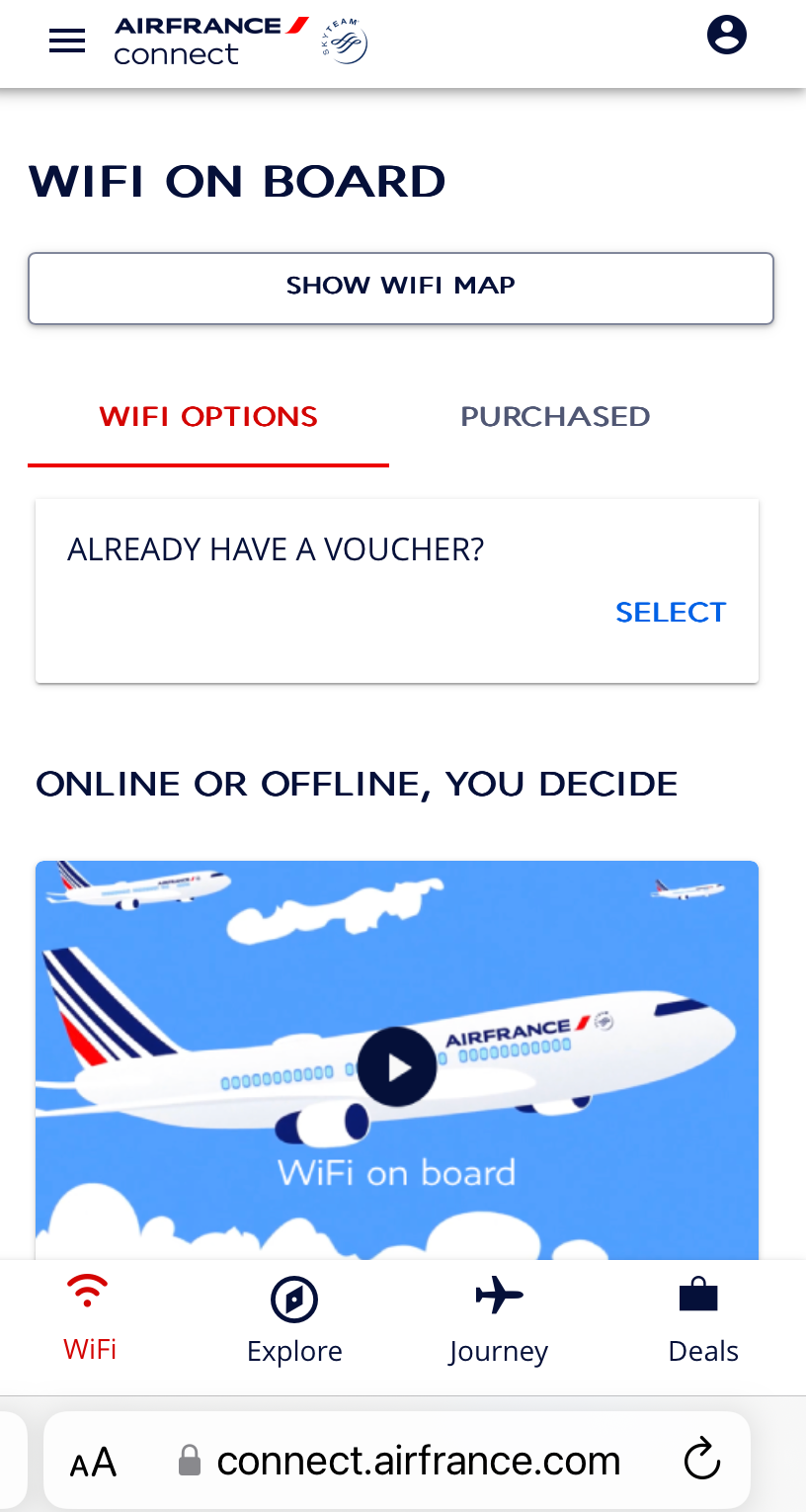
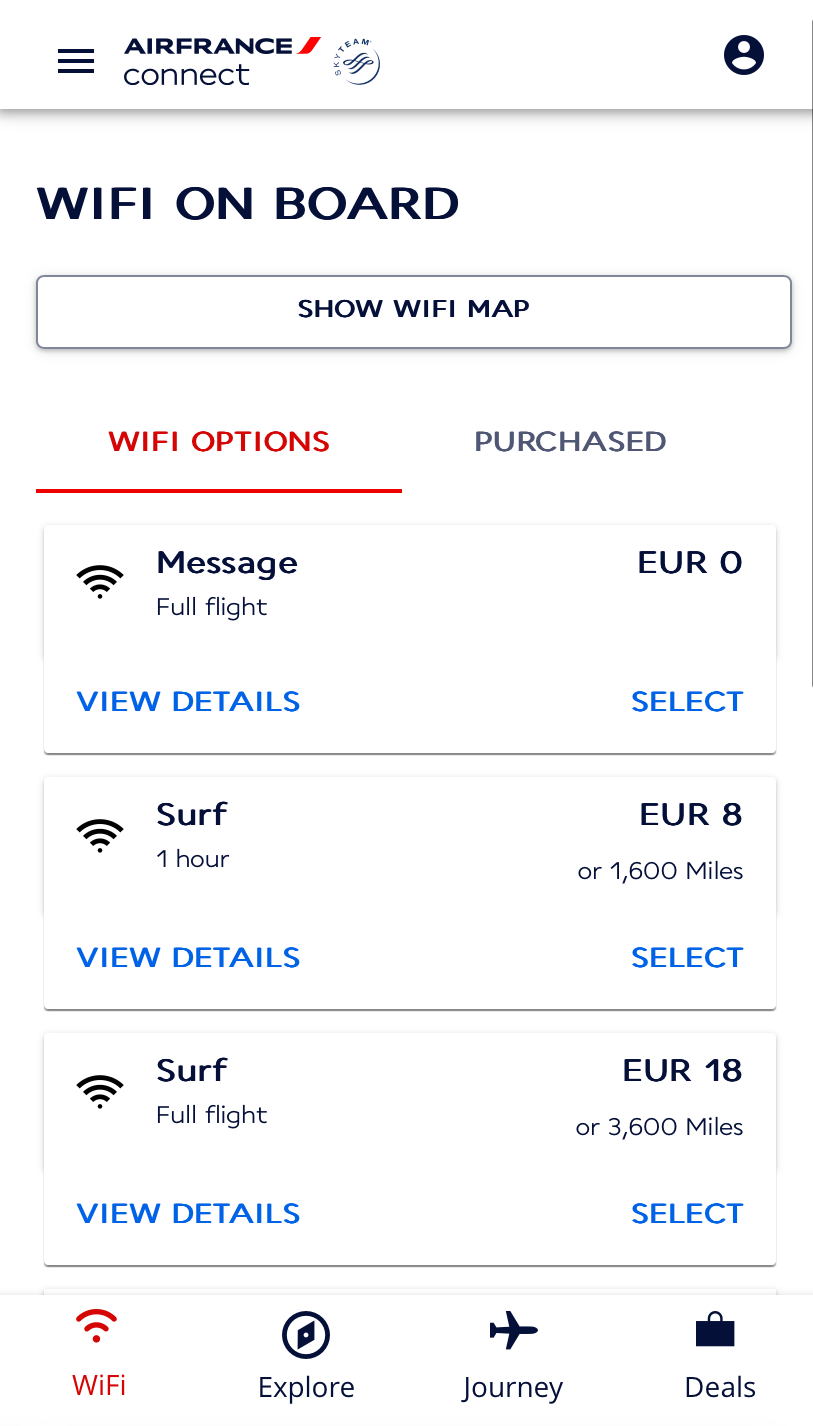

The premium economy cabin shared four lavatories behind it with the regular economy cabin, and I did not experience a wait at any point. Flight attendants kept the bathrooms clean during the flight.
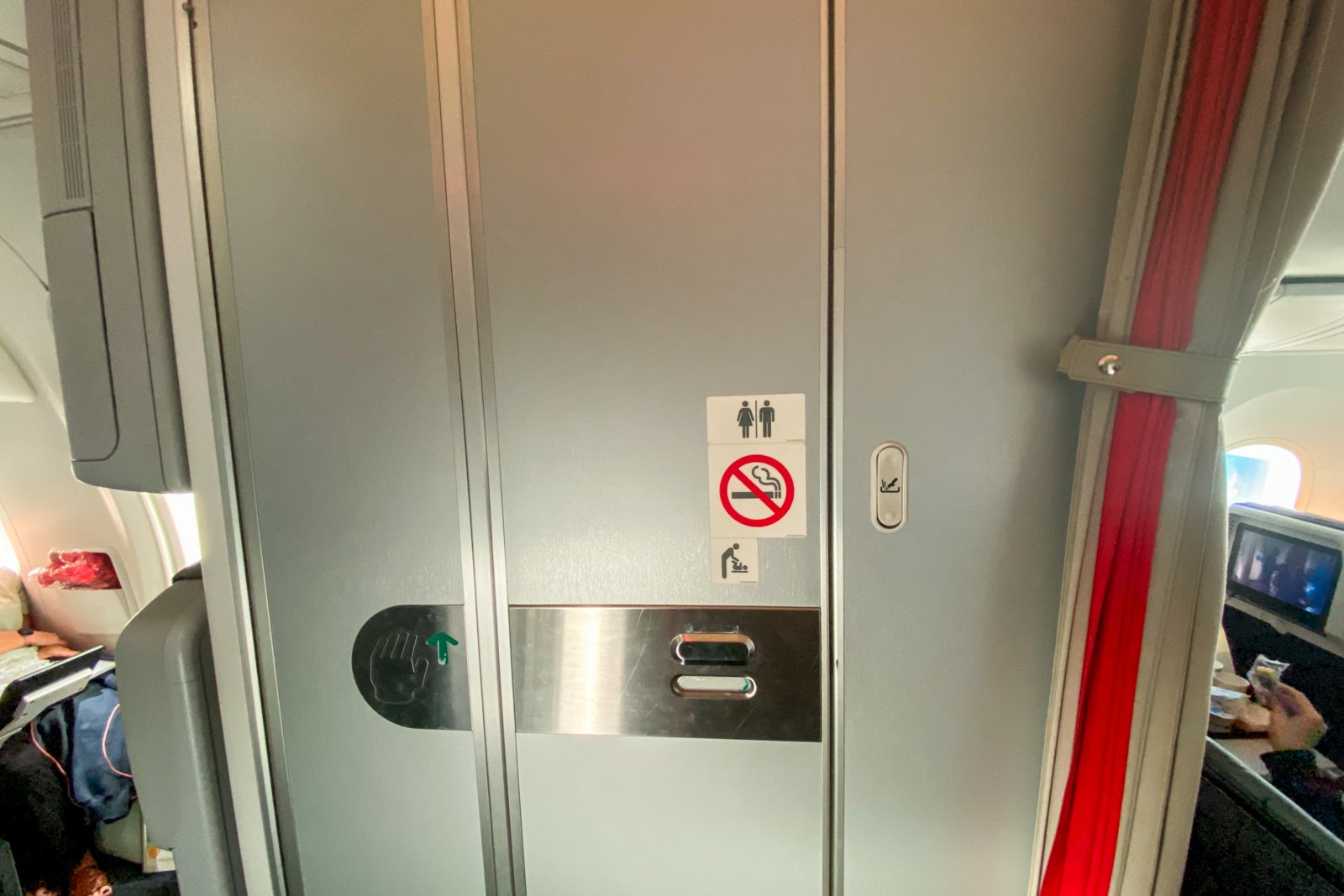
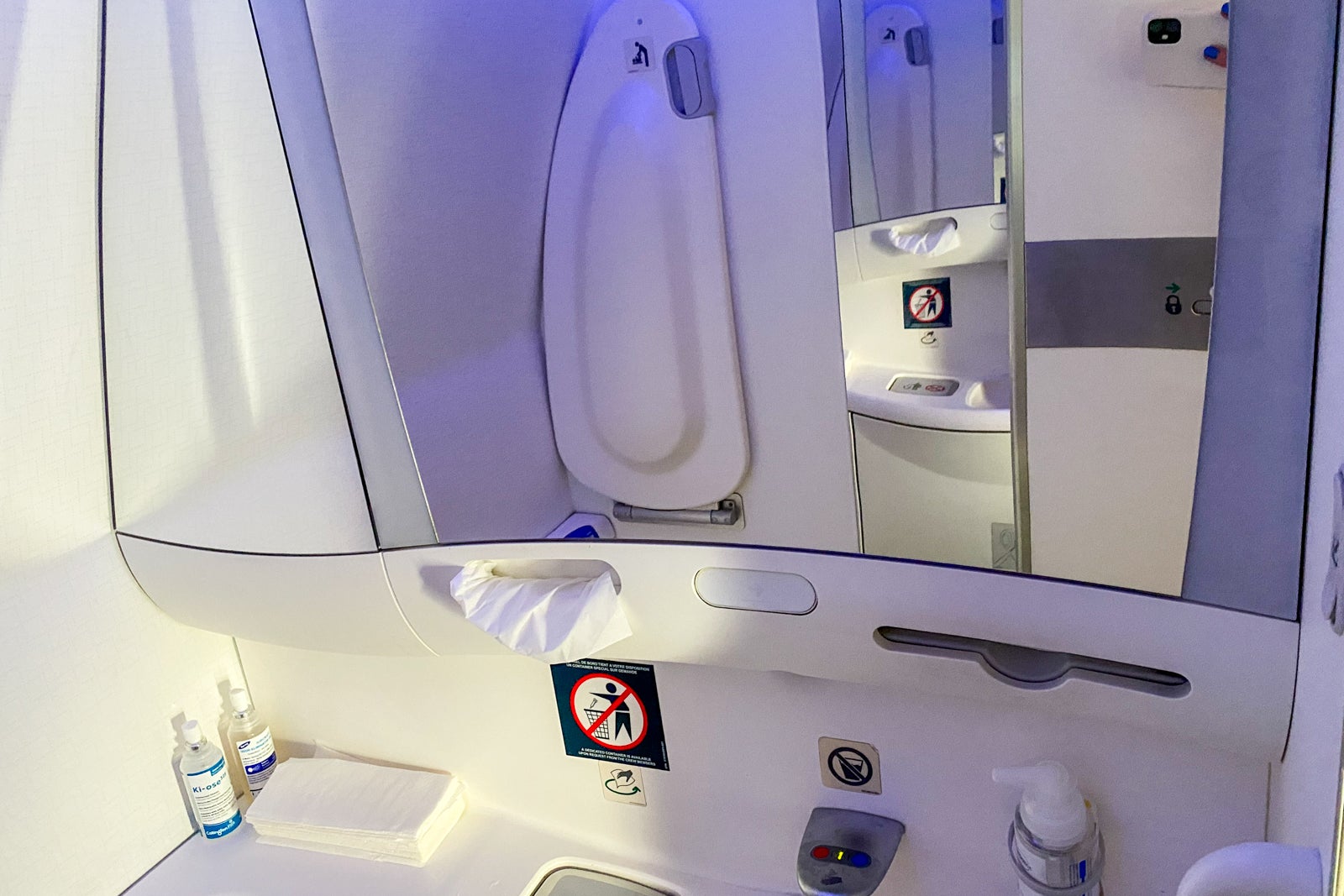
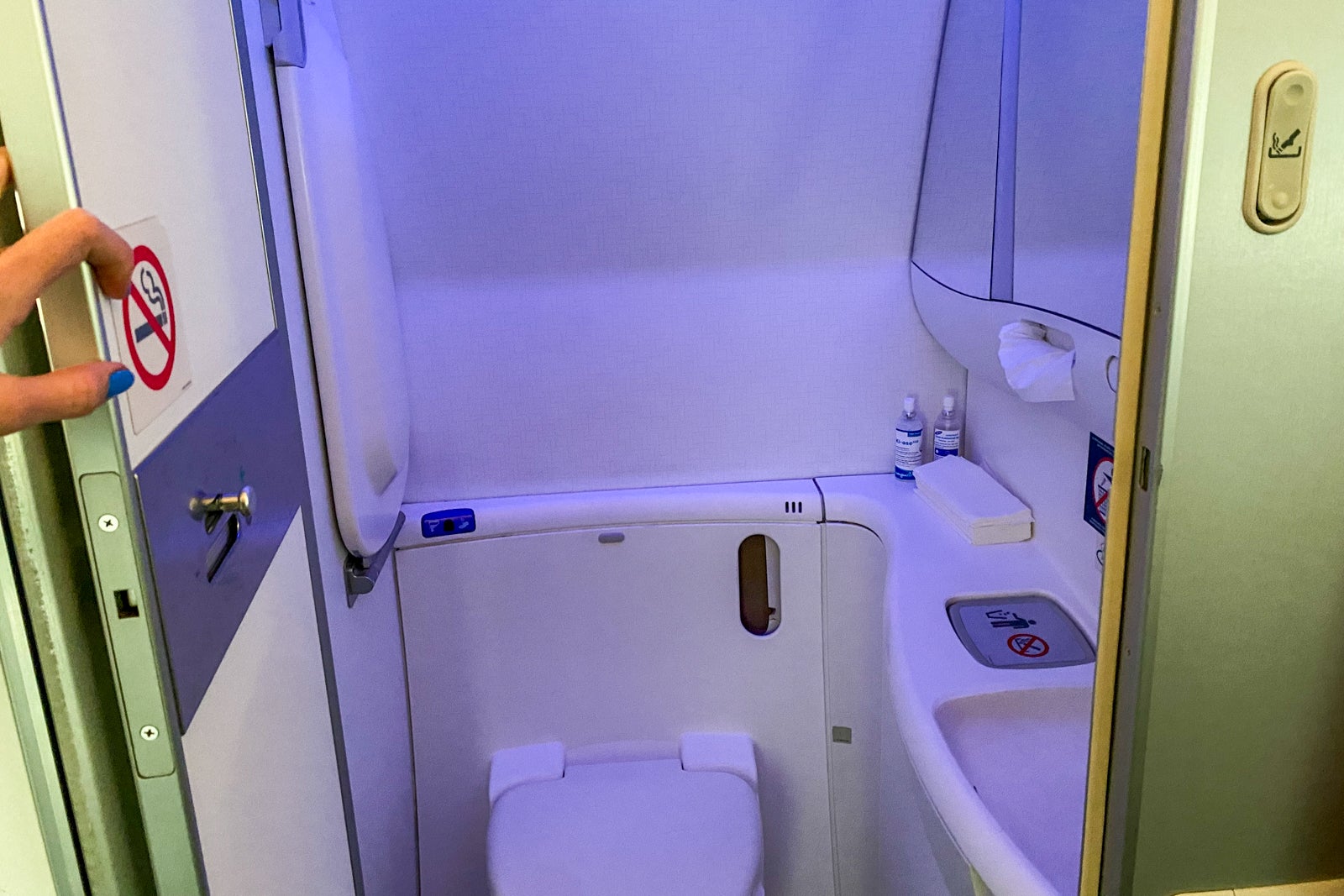
How was the food in Air France premium economy?
After learning it was my birthday, the flight crew offered me a complimentary glass of Champagne, cookies, chocolates and nuts shortly after takeoff. They also gave me a flight certificate and key chain. These goodies, along with the consistent check-ins to ensure I was doing OK, made me feel appreciated and celebrated on my birthday. This was a first for me, and it’s a reason I will never forget this flight.
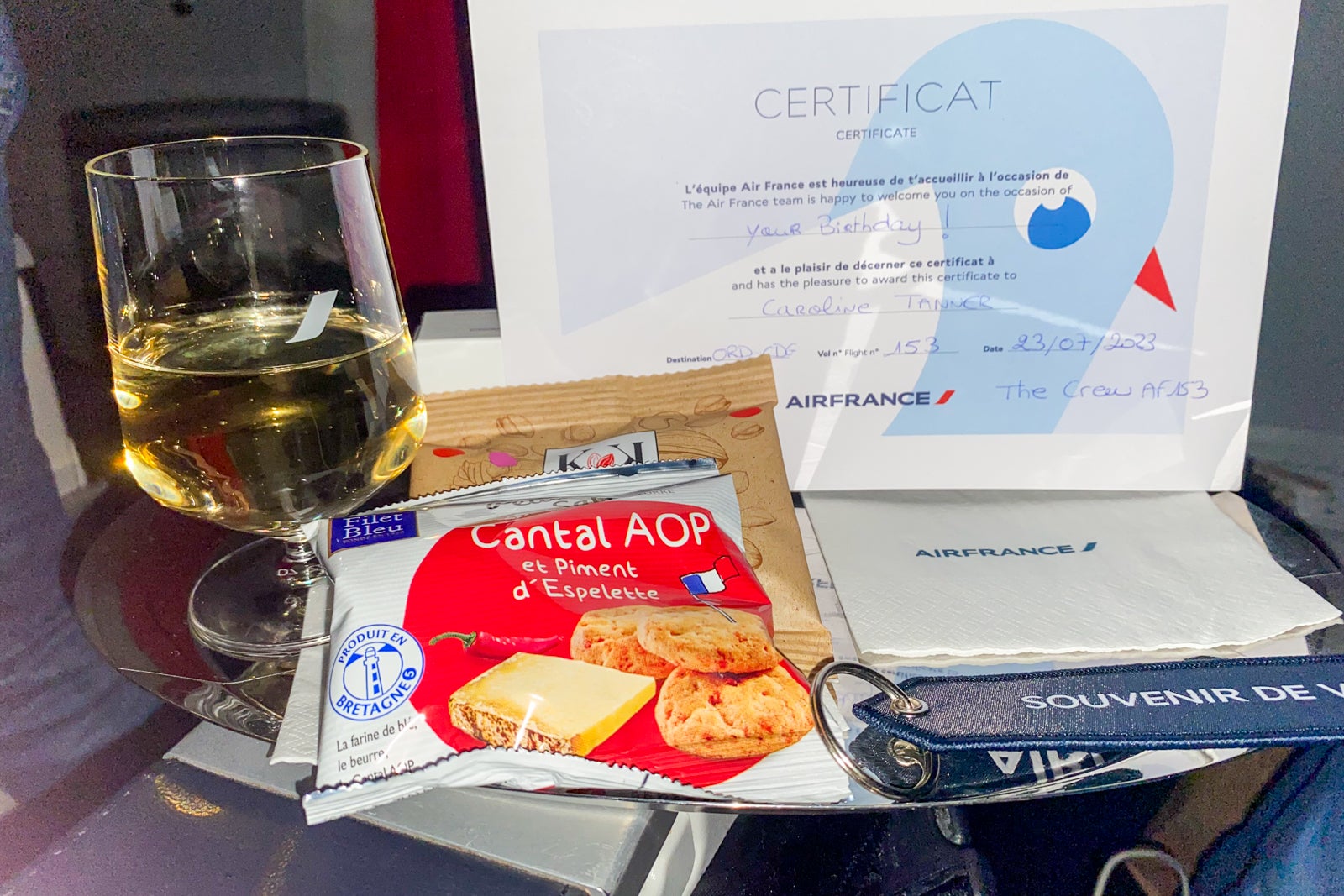
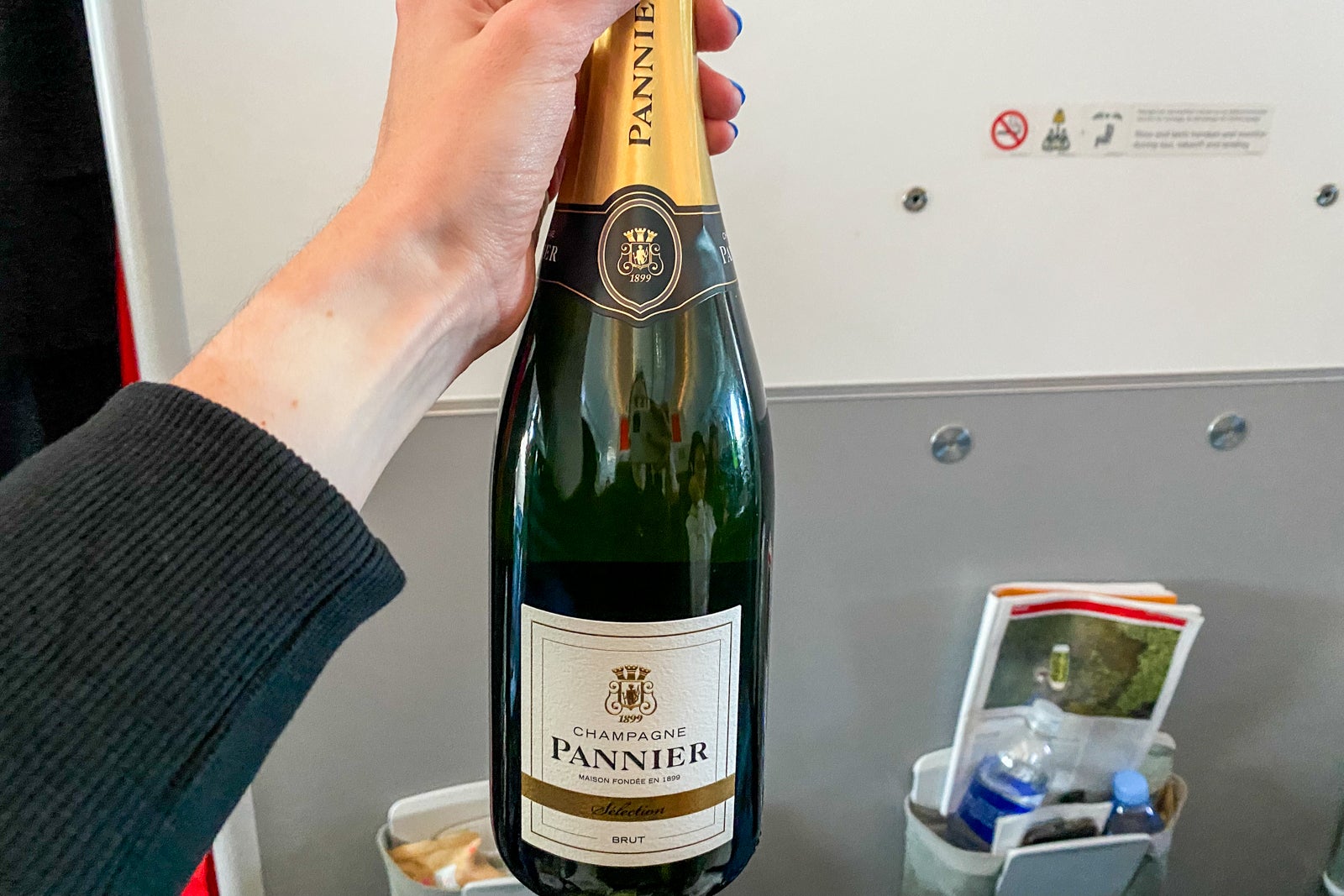
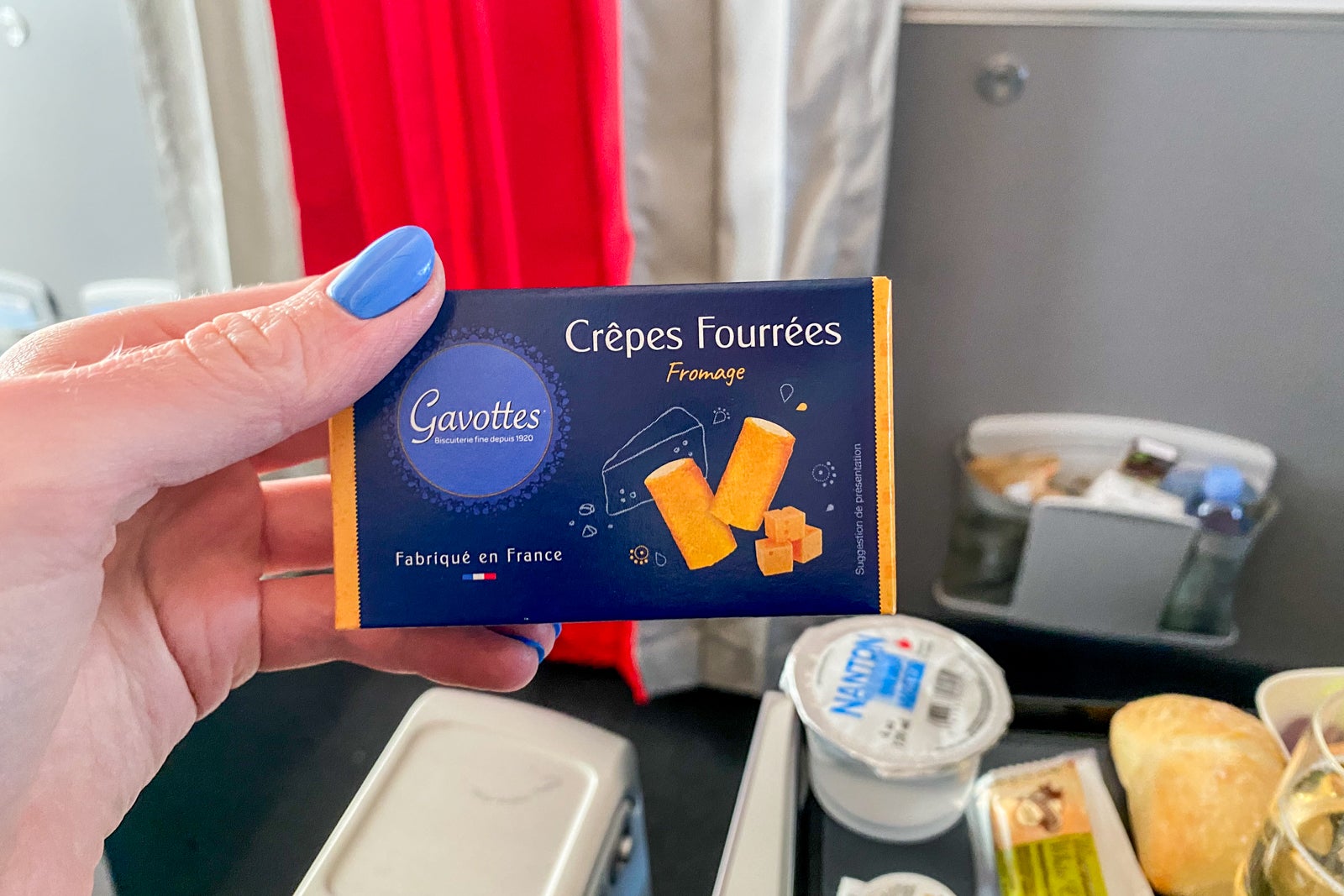
There was a beverage service before the meal, which occurred an hour after takeoff.
Even though I was seated in premium economy, they still served me the vegan economy meal that I had preordered: masala vegetarian rice, fruit, cheese and a side salad. The premium economy meals served around me were veal or chili, which looked exactly like my dish. Though I appreciated the attention to my dietary restrictions, the meal lacked taste overall, excluding the cucumbers in the salad.
There were no paper menus; rather, flyers were offered choices individually by flight attendants.
Various complimentary beverages were available, including still and sparkling water, red or white wine, Champagne, tomato juice, Sprite and Coke. In true French fashion, all passengers, regardless of cabin, could enjoy free Champagne. Business-class passengers received Champagne from $50-$60 bottles like Taittinger Brut Reserve. Premium economy and economy classes received less expensive Champagne, such as the Pannier I was served, which goes for $19.
Everything in the meal was served on a single tray. Although accompanied by metal cutlery and glassware for the alcohol (as opposed to plastic in economy), the other beverages were served in paper cups (as shown with my sparkling water below). These plastic details made it feel like an economy meal instead of a premium economy meal.
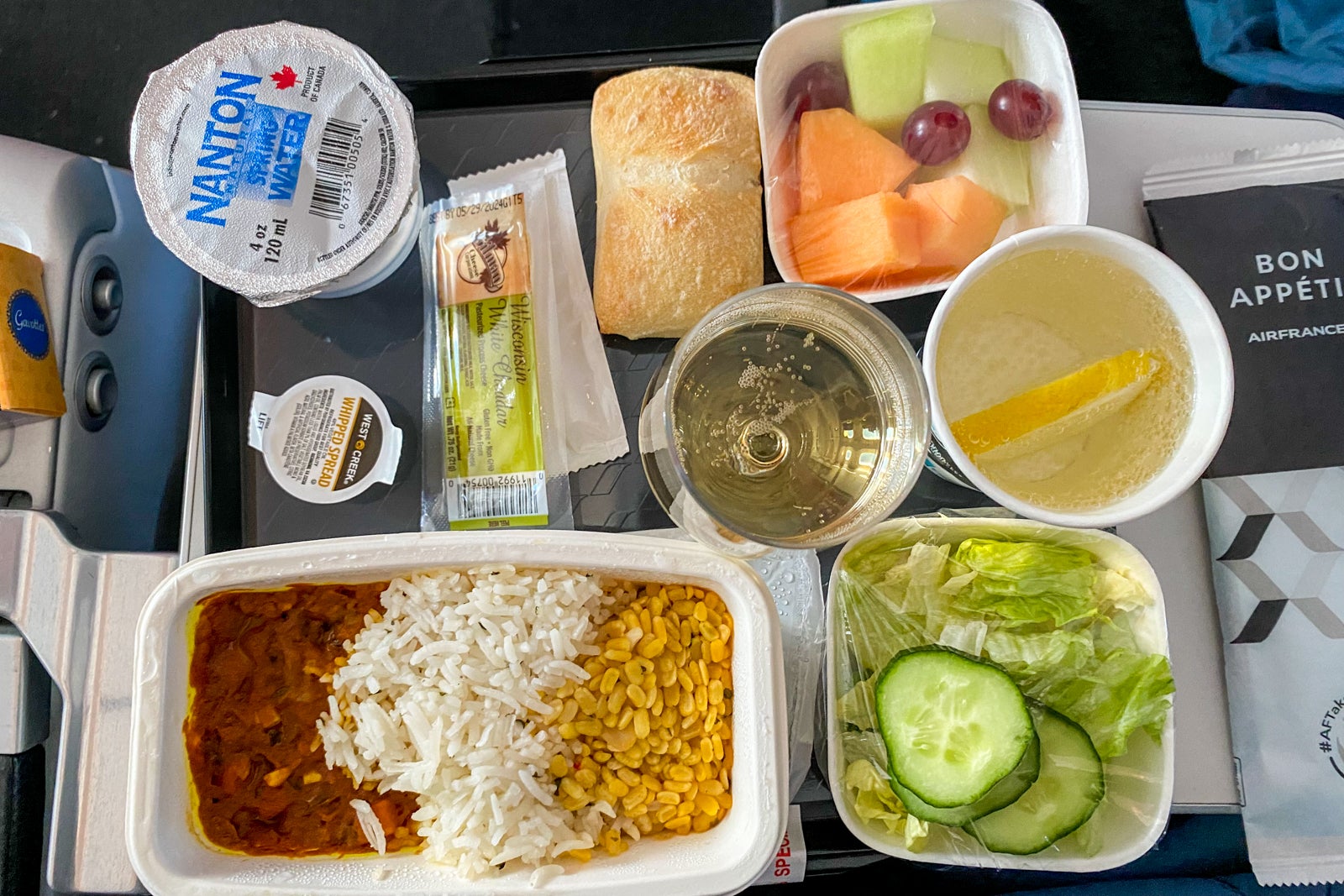
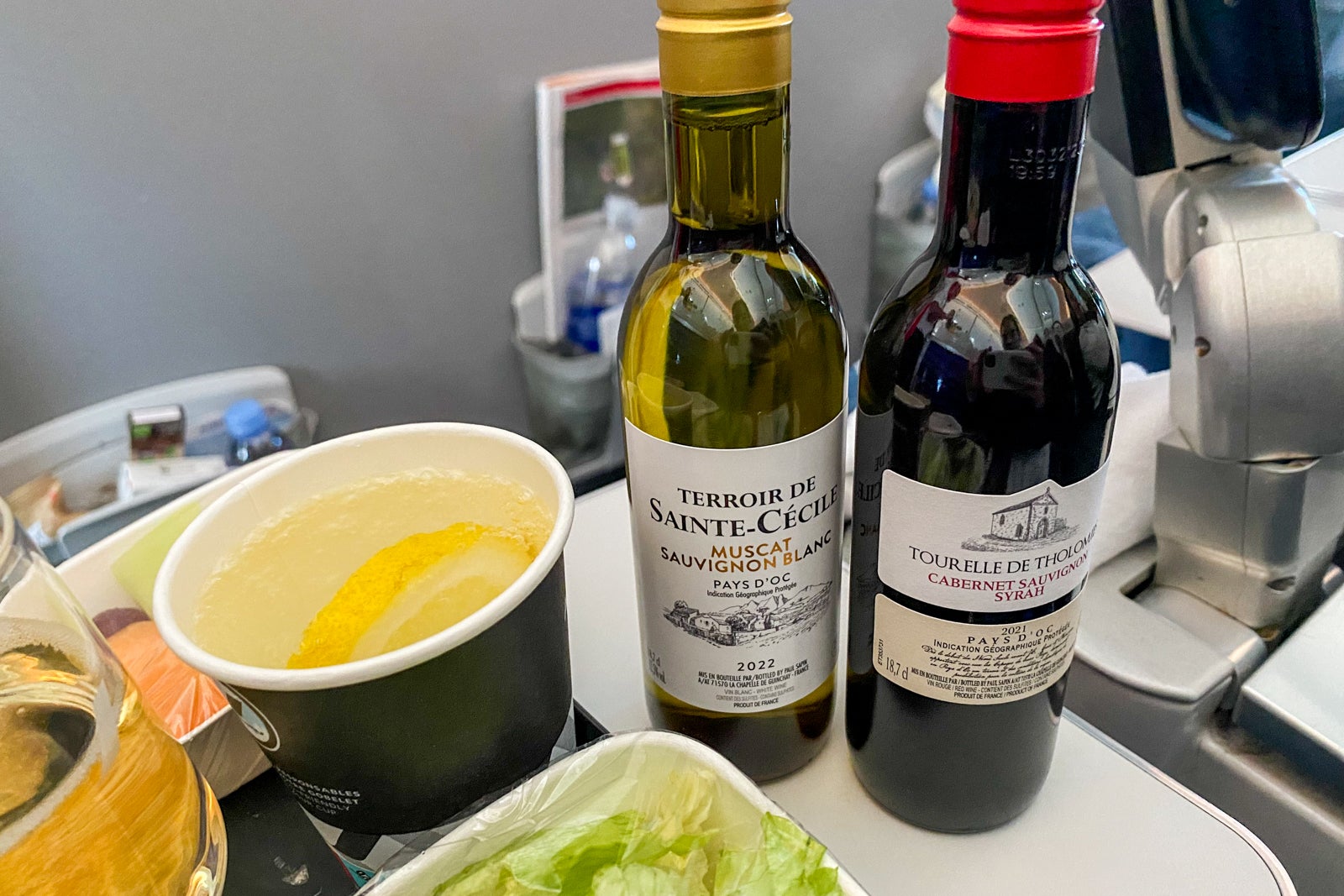
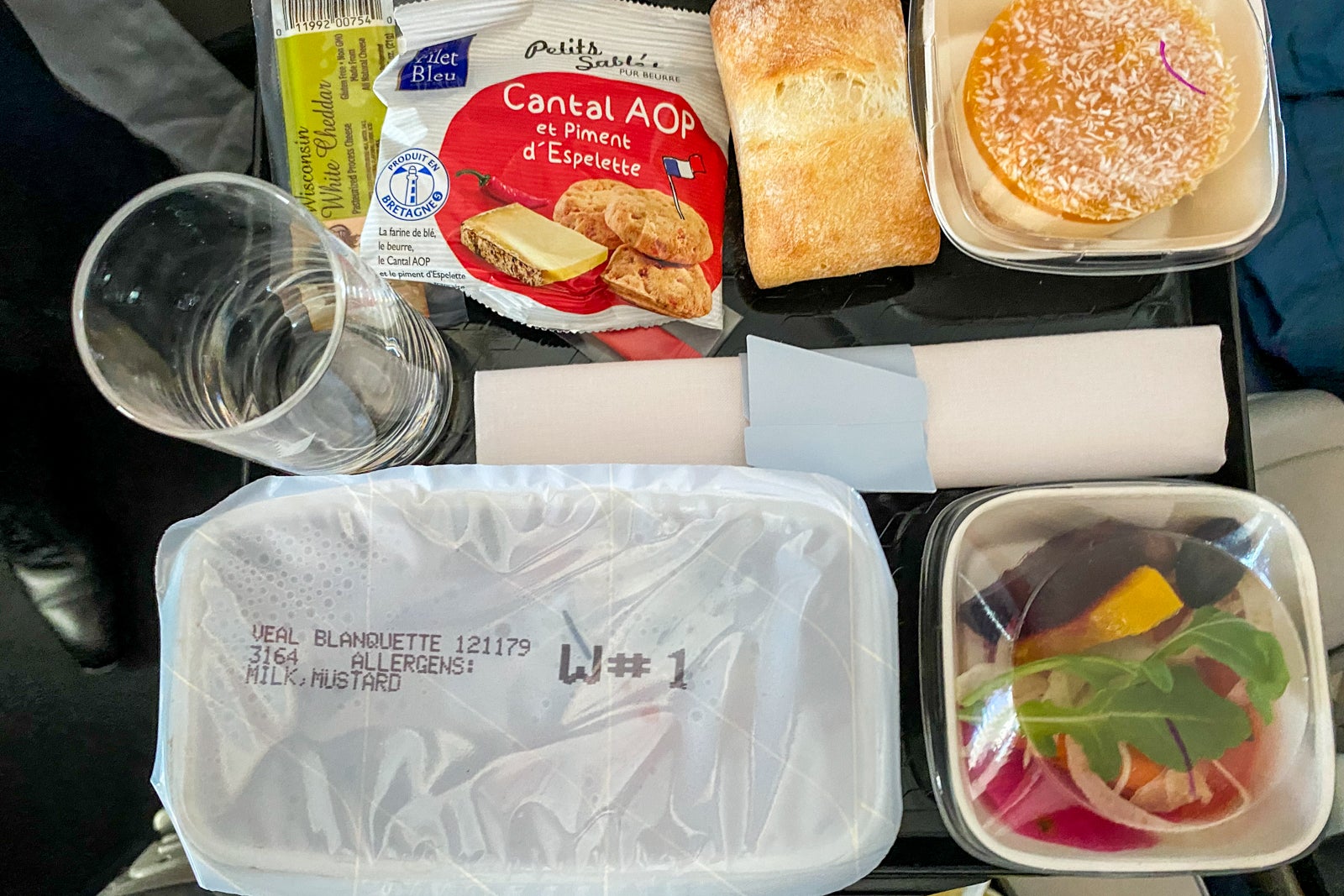
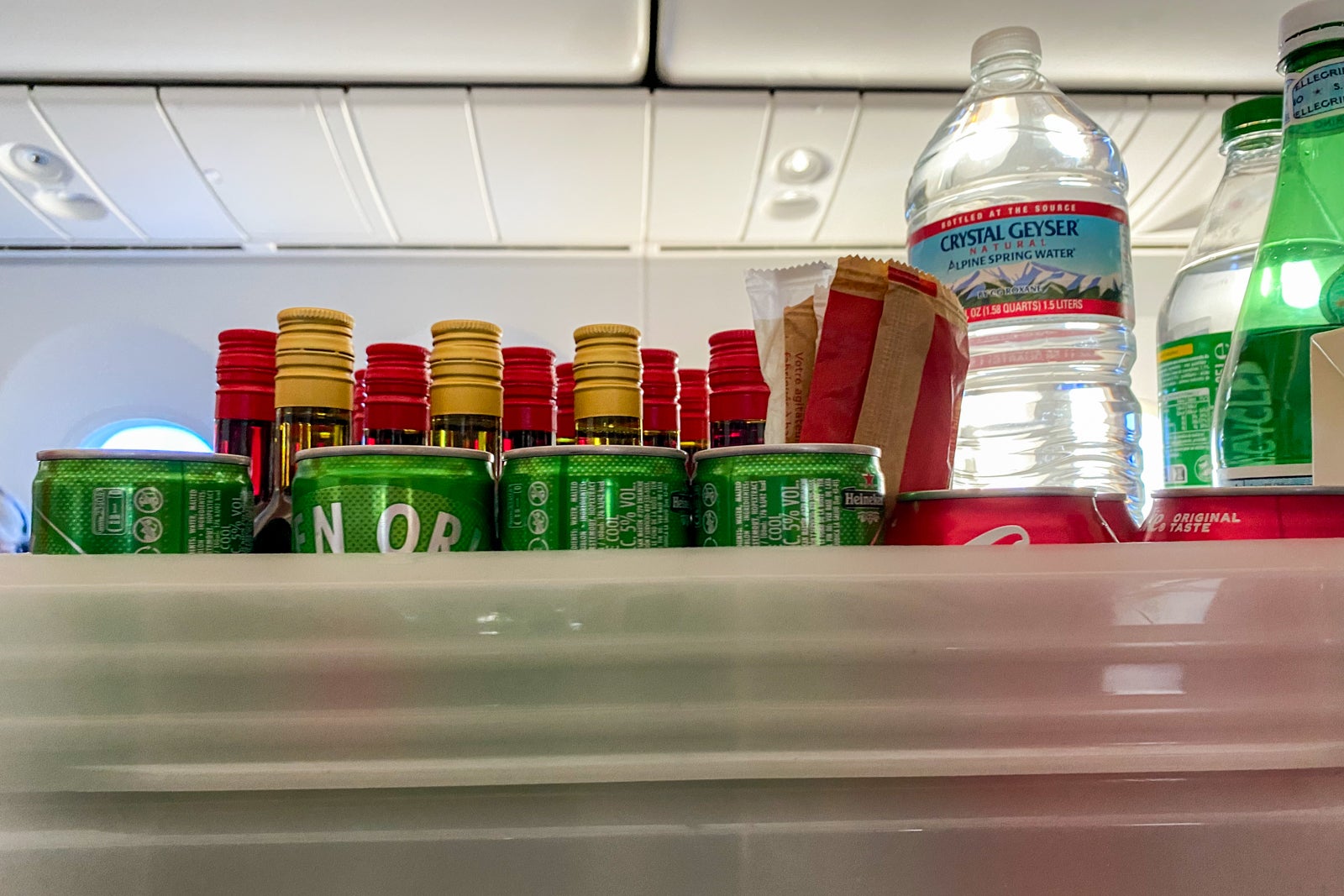
Attendants picked up dinner nearly an hour later and followed it with coffee and tea service. After approximately four hours of quiet time, my vegan breakfast box came two hours before landing. It mirrored the regular breakfast box minus the yogurt, plus a blueberry muffin, fruit and bread. As a second birthday treat, I received chocolate, biscuits and mixed nuts.
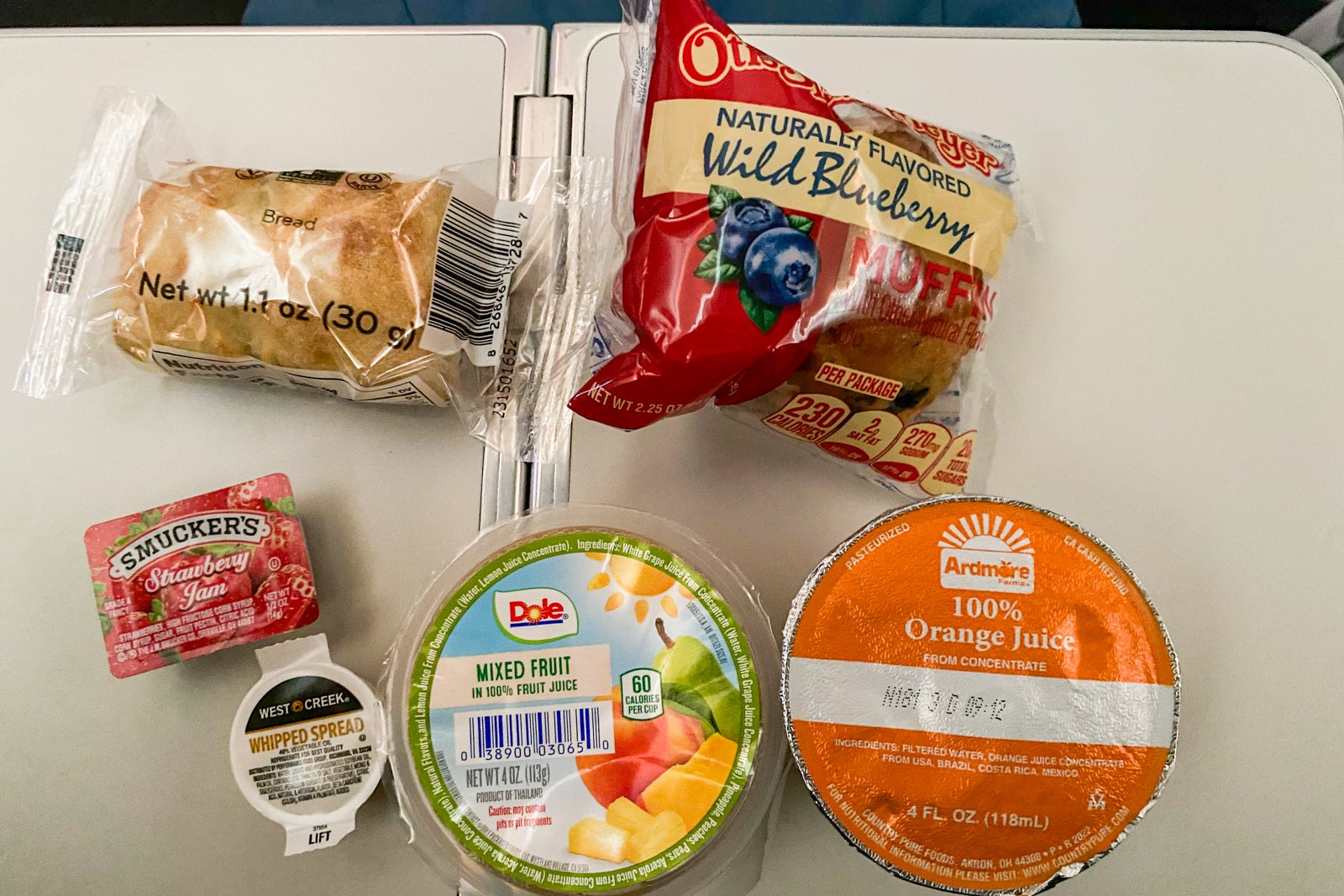
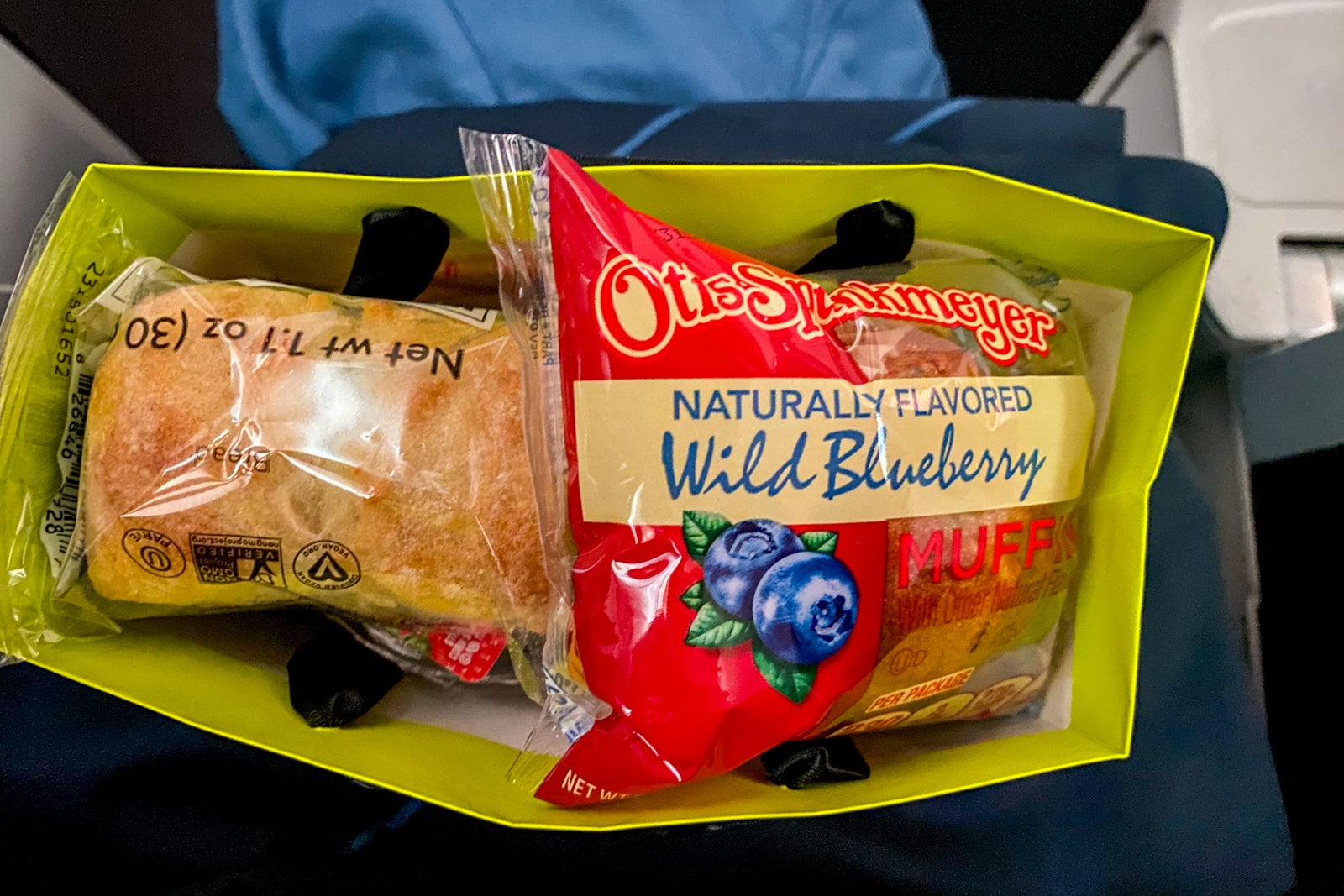
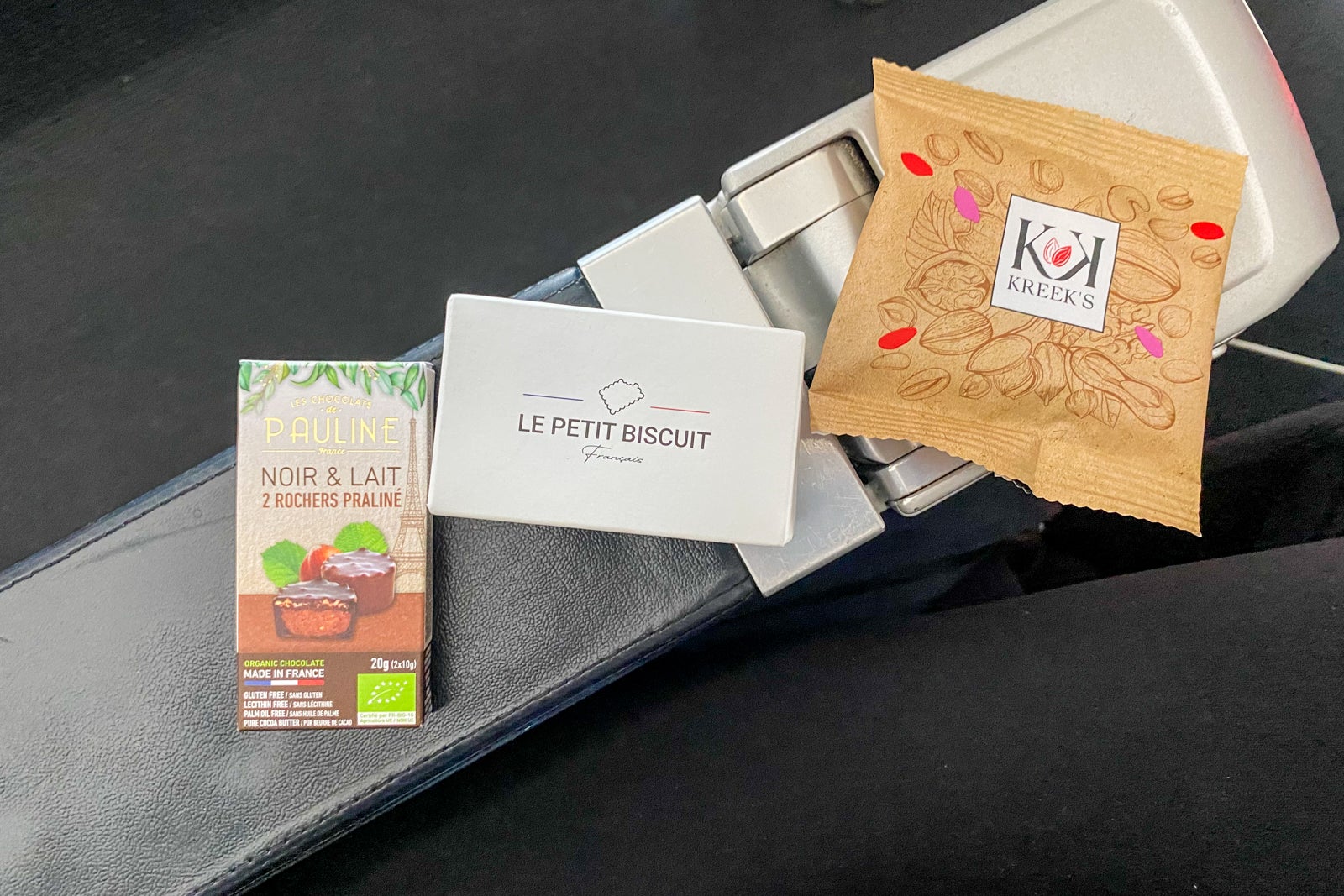
Unlike dinner, a basic breakfast box felt more like an economy meal versus a premium economy meal.
Was Air France premium economy worth it?
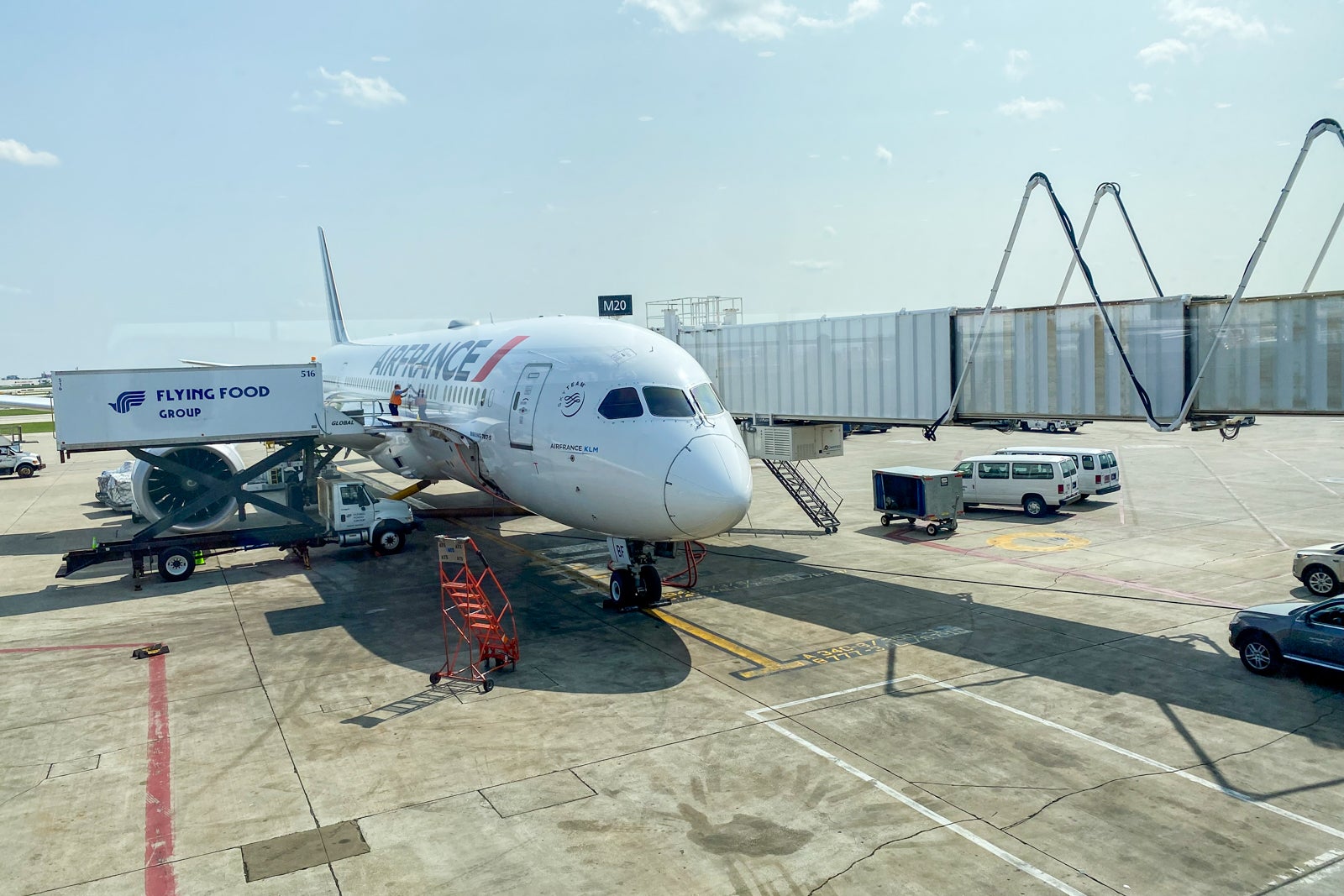
Beyond the extra treats I received and the overall fun of flying on my birthday, my first Air France premium economy experience did not feel particularly elevated. After flying back to Chicago in economy, Air France’s premium economy experience feels very similar to what folks in coach get. Despite the excellent service I received, I didn’t feel like the price differential was worth it in the end.
Although the extra legroom and seat width are an upgrade from an Air France economy seat, the seats feel outdated. Also, the hard shell concept versus the traditional recline might make it difficult for some to sleep comfortably.
The dinner meal service felt upscale thanks to amenities such as Champagne, silverware and glassware, but the food’s taste did not match its upgraded presentation. On the plus side, the entertainment system was large and had a lot of options.
For a similar price, I compared my Air France premium economy experience to the other premium economy flights I’ve flown to Paris and London.
Based on hard product, amenities and attention to detail, Air France offers less than competitors for a similar price point, such as wider seats and a recline that helped me sleep. Therefore, if you are looking to fly premium economy across the Atlantic, and prices are similar across carriers, you might want to instead consider competitors with newer seats and more elevated amenities, such as KLM or Virgin Atlantic.
If you are set on flying Air France, save your money and book economy … or splurge on Air France business class.
Related reading:
- When is the best time to book flights for the cheapest airfare?
- The best airline credit cards
- What exactly are airline miles, anyway?
- 6 real-life strategies you can use when your flight is canceled or delayed
- Maximize your airfare: The best credit cards for booking flights
- The best credit cards to reach elite status
- What are points and miles worth? TPG’s monthly valuations




